Professional Skills, Knowledge and Behaviour in HR Expert
VerifiedAdded on 2023/01/11
|20
|4759
|41
AI Summary
This project demonstrates professional skills, knowledge and behaviour required by HR experts in an organization. It also analyzes personal skill audit for building a professional development plan.
Contribute Materials
Your contribution can guide someone’s learning journey. Share your
documents today.
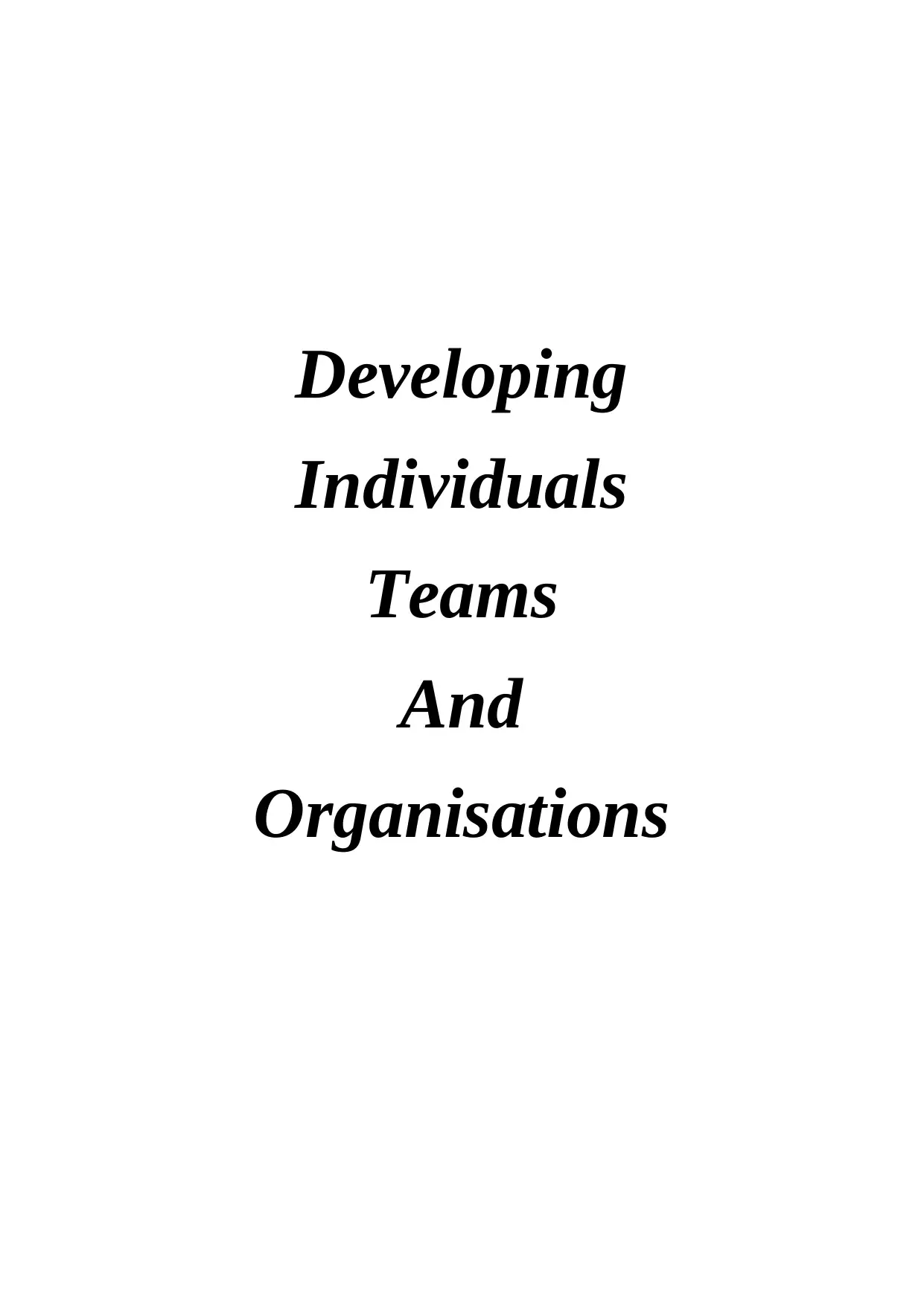
Developing
Individuals
Teams
And
Organisations
Individuals
Teams
And
Organisations
Secure Best Marks with AI Grader
Need help grading? Try our AI Grader for instant feedback on your assignments.
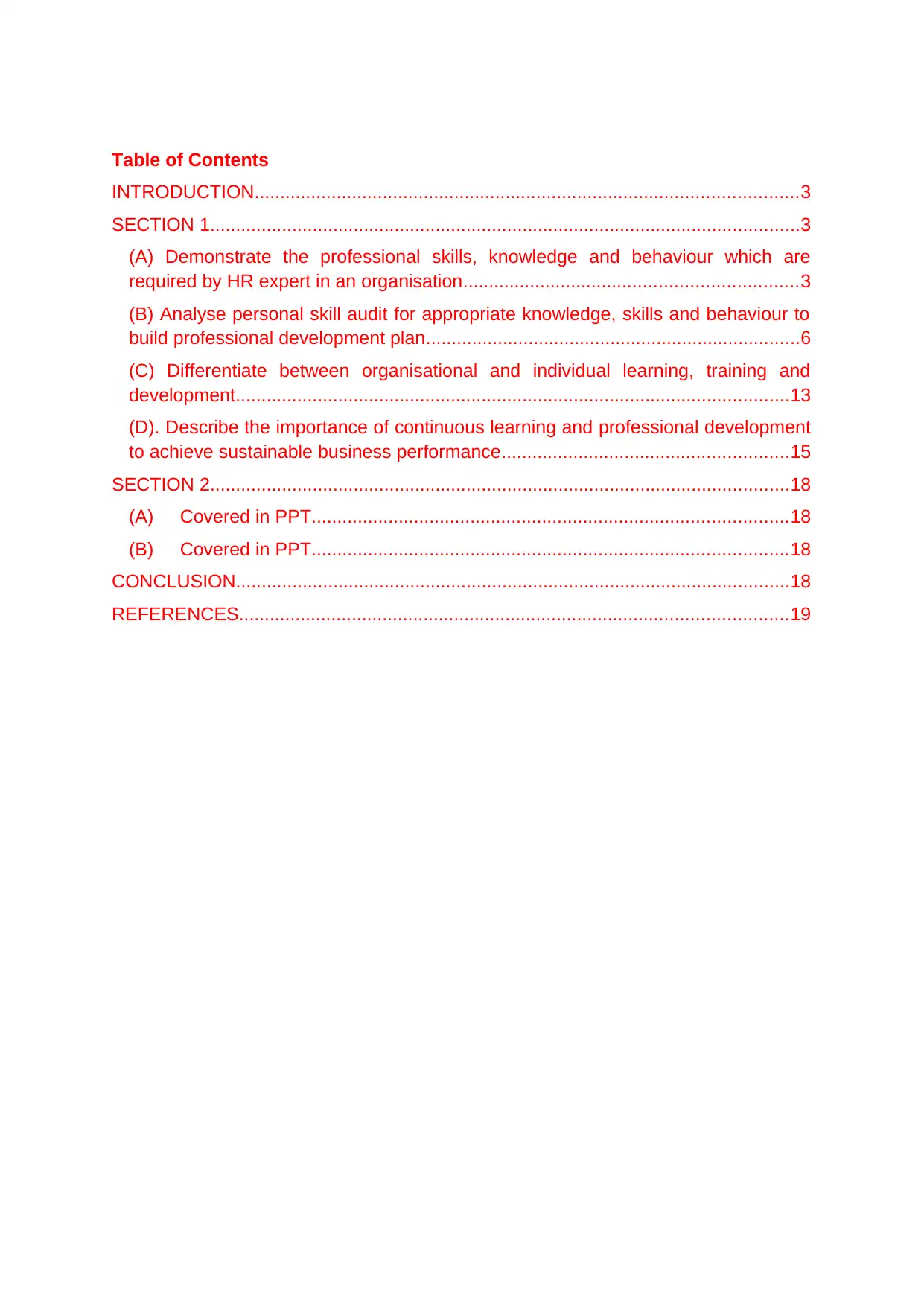
Table of Contents
INTRODUCTION..........................................................................................................3
SECTION 1...................................................................................................................3
(A) Demonstrate the professional skills, knowledge and behaviour which are
required by HR expert in an organisation.................................................................3
(B) Analyse personal skill audit for appropriate knowledge, skills and behaviour to
build professional development plan.........................................................................6
(C) Differentiate between organisational and individual learning, training and
development............................................................................................................13
(D). Describe the importance of continuous learning and professional development
to achieve sustainable business performance........................................................15
SECTION 2.................................................................................................................18
(A) Covered in PPT.............................................................................................18
(B) Covered in PPT.............................................................................................18
CONCLUSION............................................................................................................18
REFERENCES...........................................................................................................19
INTRODUCTION..........................................................................................................3
SECTION 1...................................................................................................................3
(A) Demonstrate the professional skills, knowledge and behaviour which are
required by HR expert in an organisation.................................................................3
(B) Analyse personal skill audit for appropriate knowledge, skills and behaviour to
build professional development plan.........................................................................6
(C) Differentiate between organisational and individual learning, training and
development............................................................................................................13
(D). Describe the importance of continuous learning and professional development
to achieve sustainable business performance........................................................15
SECTION 2.................................................................................................................18
(A) Covered in PPT.............................................................................................18
(B) Covered in PPT.............................................................................................18
CONCLUSION............................................................................................................18
REFERENCES...........................................................................................................19
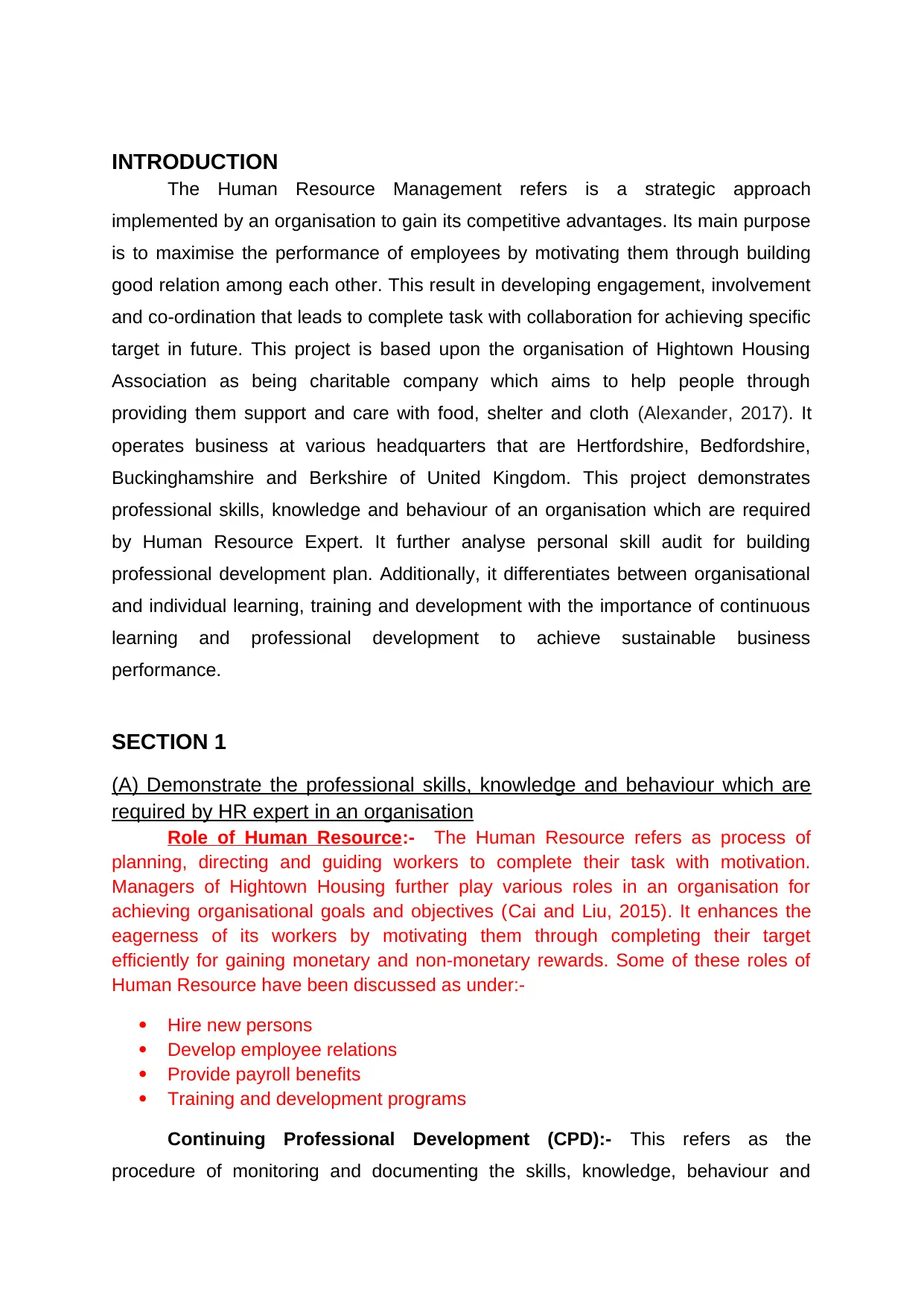
INTRODUCTION
The Human Resource Management refers is a strategic approach
implemented by an organisation to gain its competitive advantages. Its main purpose
is to maximise the performance of employees by motivating them through building
good relation among each other. This result in developing engagement, involvement
and co-ordination that leads to complete task with collaboration for achieving specific
target in future. This project is based upon the organisation of Hightown Housing
Association as being charitable company which aims to help people through
providing them support and care with food, shelter and cloth (Alexander, 2017). It
operates business at various headquarters that are Hertfordshire, Bedfordshire,
Buckinghamshire and Berkshire of United Kingdom. This project demonstrates
professional skills, knowledge and behaviour of an organisation which are required
by Human Resource Expert. It further analyse personal skill audit for building
professional development plan. Additionally, it differentiates between organisational
and individual learning, training and development with the importance of continuous
learning and professional development to achieve sustainable business
performance.
SECTION 1
(A) Demonstrate the professional skills, knowledge and behaviour which are
required by HR expert in an organisation
Role of Human Resource:- The Human Resource refers as process of
planning, directing and guiding workers to complete their task with motivation.
Managers of Hightown Housing further play various roles in an organisation for
achieving organisational goals and objectives (Cai and Liu, 2015). It enhances the
eagerness of its workers by motivating them through completing their target
efficiently for gaining monetary and non-monetary rewards. Some of these roles of
Human Resource have been discussed as under:-
Hire new persons
Develop employee relations
Provide payroll benefits
Training and development programs
Continuing Professional Development (CPD):- This refers as the
procedure of monitoring and documenting the skills, knowledge, behaviour and
The Human Resource Management refers is a strategic approach
implemented by an organisation to gain its competitive advantages. Its main purpose
is to maximise the performance of employees by motivating them through building
good relation among each other. This result in developing engagement, involvement
and co-ordination that leads to complete task with collaboration for achieving specific
target in future. This project is based upon the organisation of Hightown Housing
Association as being charitable company which aims to help people through
providing them support and care with food, shelter and cloth (Alexander, 2017). It
operates business at various headquarters that are Hertfordshire, Bedfordshire,
Buckinghamshire and Berkshire of United Kingdom. This project demonstrates
professional skills, knowledge and behaviour of an organisation which are required
by Human Resource Expert. It further analyse personal skill audit for building
professional development plan. Additionally, it differentiates between organisational
and individual learning, training and development with the importance of continuous
learning and professional development to achieve sustainable business
performance.
SECTION 1
(A) Demonstrate the professional skills, knowledge and behaviour which are
required by HR expert in an organisation
Role of Human Resource:- The Human Resource refers as process of
planning, directing and guiding workers to complete their task with motivation.
Managers of Hightown Housing further play various roles in an organisation for
achieving organisational goals and objectives (Cai and Liu, 2015). It enhances the
eagerness of its workers by motivating them through completing their target
efficiently for gaining monetary and non-monetary rewards. Some of these roles of
Human Resource have been discussed as under:-
Hire new persons
Develop employee relations
Provide payroll benefits
Training and development programs
Continuing Professional Development (CPD):- This refers as the
procedure of monitoring and documenting the skills, knowledge, behaviour and
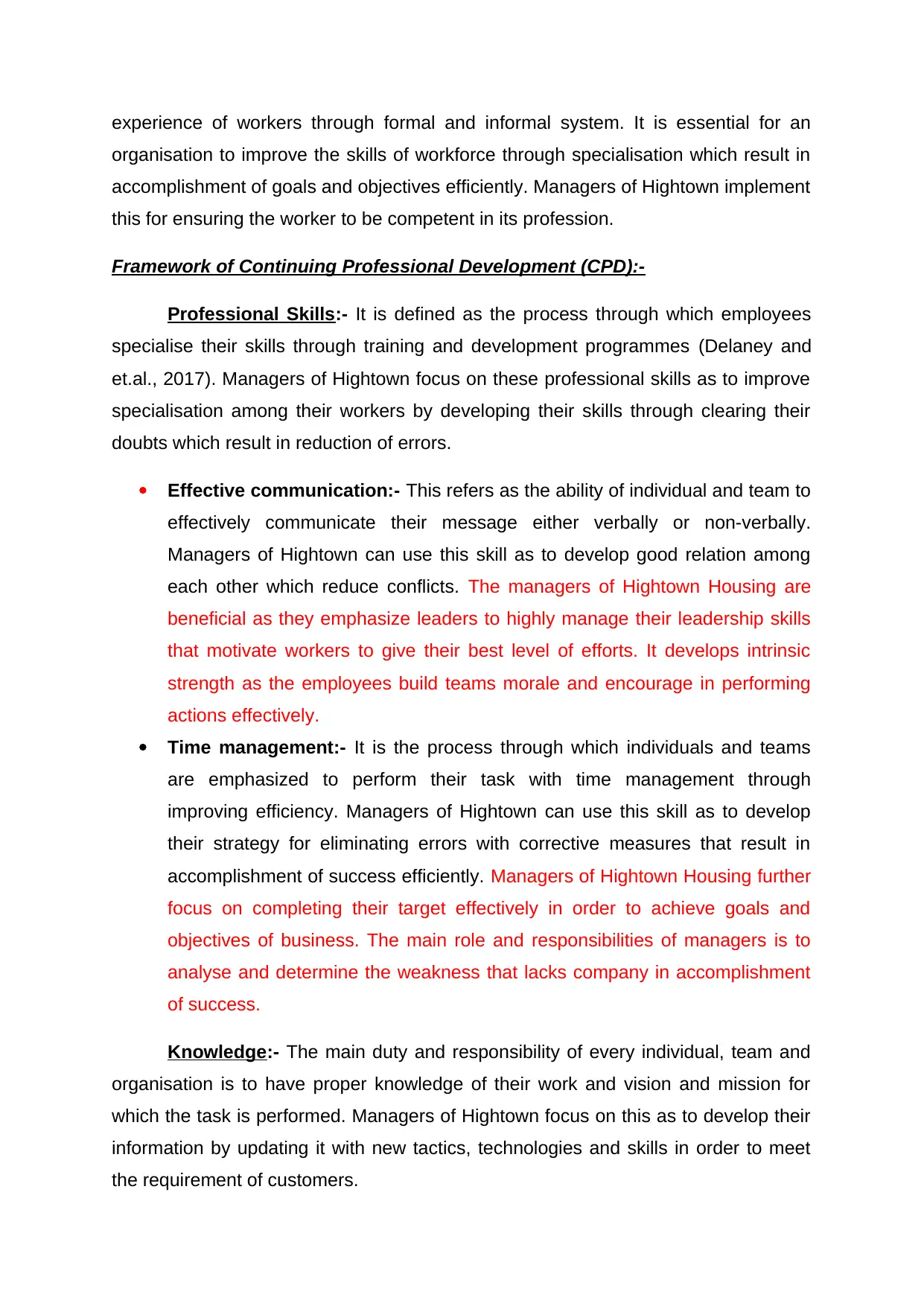
experience of workers through formal and informal system. It is essential for an
organisation to improve the skills of workforce through specialisation which result in
accomplishment of goals and objectives efficiently. Managers of Hightown implement
this for ensuring the worker to be competent in its profession.
Framework of Continuing Professional Development (CPD):-
Professional Skills:- It is defined as the process through which employees
specialise their skills through training and development programmes (Delaney and
et.al., 2017). Managers of Hightown focus on these professional skills as to improve
specialisation among their workers by developing their skills through clearing their
doubts which result in reduction of errors.
Effective communication:- This refers as the ability of individual and team to
effectively communicate their message either verbally or non-verbally.
Managers of Hightown can use this skill as to develop good relation among
each other which reduce conflicts. The managers of Hightown Housing are
beneficial as they emphasize leaders to highly manage their leadership skills
that motivate workers to give their best level of efforts. It develops intrinsic
strength as the employees build teams morale and encourage in performing
actions effectively.
Time management:- It is the process through which individuals and teams
are emphasized to perform their task with time management through
improving efficiency. Managers of Hightown can use this skill as to develop
their strategy for eliminating errors with corrective measures that result in
accomplishment of success efficiently. Managers of Hightown Housing further
focus on completing their target effectively in order to achieve goals and
objectives of business. The main role and responsibilities of managers is to
analyse and determine the weakness that lacks company in accomplishment
of success.
Knowledge:- The main duty and responsibility of every individual, team and
organisation is to have proper knowledge of their work and vision and mission for
which the task is performed. Managers of Hightown focus on this as to develop their
information by updating it with new tactics, technologies and skills in order to meet
the requirement of customers.
organisation to improve the skills of workforce through specialisation which result in
accomplishment of goals and objectives efficiently. Managers of Hightown implement
this for ensuring the worker to be competent in its profession.
Framework of Continuing Professional Development (CPD):-
Professional Skills:- It is defined as the process through which employees
specialise their skills through training and development programmes (Delaney and
et.al., 2017). Managers of Hightown focus on these professional skills as to improve
specialisation among their workers by developing their skills through clearing their
doubts which result in reduction of errors.
Effective communication:- This refers as the ability of individual and team to
effectively communicate their message either verbally or non-verbally.
Managers of Hightown can use this skill as to develop good relation among
each other which reduce conflicts. The managers of Hightown Housing are
beneficial as they emphasize leaders to highly manage their leadership skills
that motivate workers to give their best level of efforts. It develops intrinsic
strength as the employees build teams morale and encourage in performing
actions effectively.
Time management:- It is the process through which individuals and teams
are emphasized to perform their task with time management through
improving efficiency. Managers of Hightown can use this skill as to develop
their strategy for eliminating errors with corrective measures that result in
accomplishment of success efficiently. Managers of Hightown Housing further
focus on completing their target effectively in order to achieve goals and
objectives of business. The main role and responsibilities of managers is to
analyse and determine the weakness that lacks company in accomplishment
of success.
Knowledge:- The main duty and responsibility of every individual, team and
organisation is to have proper knowledge of their work and vision and mission for
which the task is performed. Managers of Hightown focus on this as to develop their
information by updating it with new tactics, technologies and skills in order to meet
the requirement of customers.
Secure Best Marks with AI Grader
Need help grading? Try our AI Grader for instant feedback on your assignments.
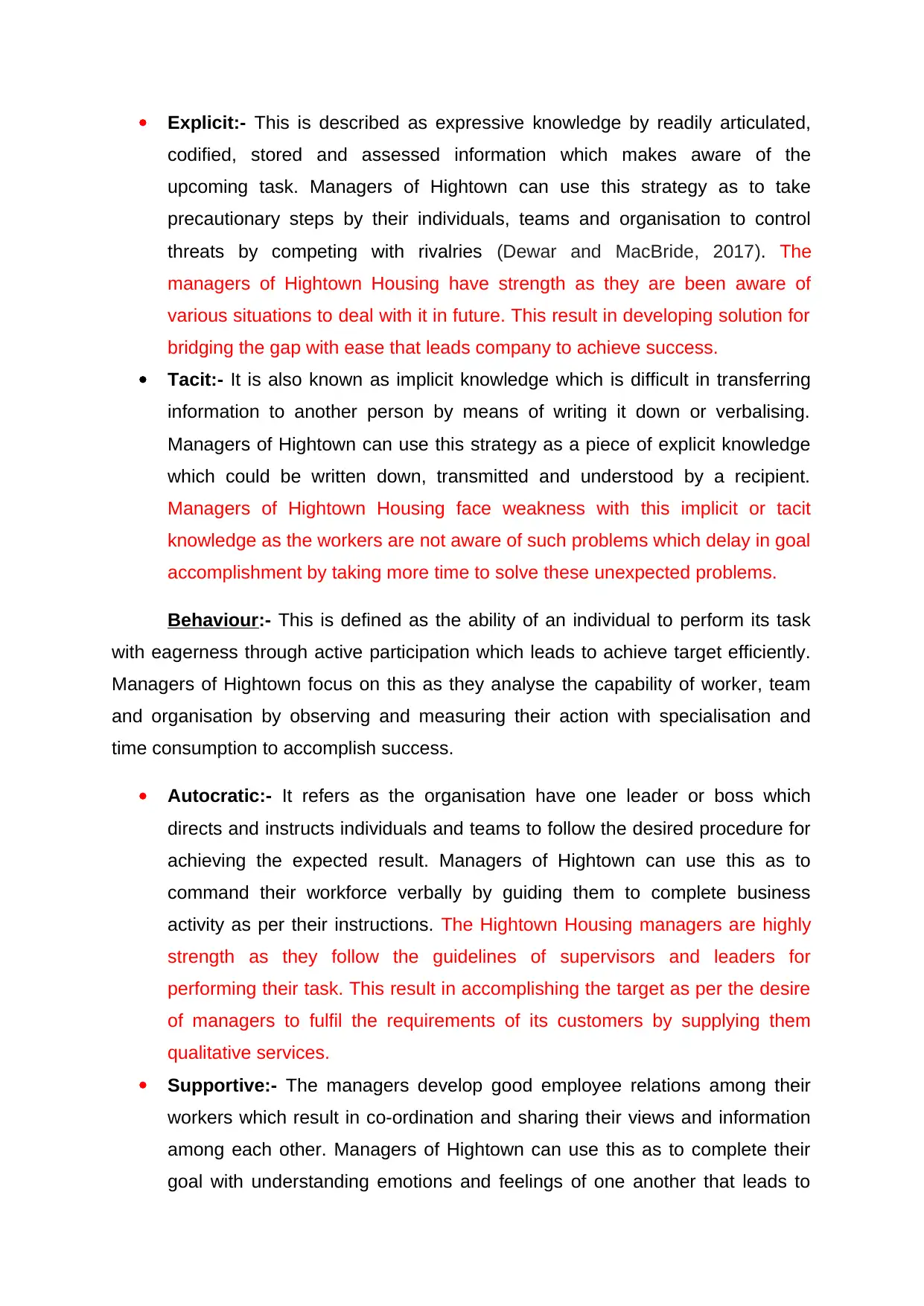
Explicit:- This is described as expressive knowledge by readily articulated,
codified, stored and assessed information which makes aware of the
upcoming task. Managers of Hightown can use this strategy as to take
precautionary steps by their individuals, teams and organisation to control
threats by competing with rivalries (Dewar and MacBride, 2017). The
managers of Hightown Housing have strength as they are been aware of
various situations to deal with it in future. This result in developing solution for
bridging the gap with ease that leads company to achieve success.
Tacit:- It is also known as implicit knowledge which is difficult in transferring
information to another person by means of writing it down or verbalising.
Managers of Hightown can use this strategy as a piece of explicit knowledge
which could be written down, transmitted and understood by a recipient.
Managers of Hightown Housing face weakness with this implicit or tacit
knowledge as the workers are not aware of such problems which delay in goal
accomplishment by taking more time to solve these unexpected problems.
Behaviour:- This is defined as the ability of an individual to perform its task
with eagerness through active participation which leads to achieve target efficiently.
Managers of Hightown focus on this as they analyse the capability of worker, team
and organisation by observing and measuring their action with specialisation and
time consumption to accomplish success.
Autocratic:- It refers as the organisation have one leader or boss which
directs and instructs individuals and teams to follow the desired procedure for
achieving the expected result. Managers of Hightown can use this as to
command their workforce verbally by guiding them to complete business
activity as per their instructions. The Hightown Housing managers are highly
strength as they follow the guidelines of supervisors and leaders for
performing their task. This result in accomplishing the target as per the desire
of managers to fulfil the requirements of its customers by supplying them
qualitative services.
Supportive:- The managers develop good employee relations among their
workers which result in co-ordination and sharing their views and information
among each other. Managers of Hightown can use this as to complete their
goal with understanding emotions and feelings of one another that leads to
codified, stored and assessed information which makes aware of the
upcoming task. Managers of Hightown can use this strategy as to take
precautionary steps by their individuals, teams and organisation to control
threats by competing with rivalries (Dewar and MacBride, 2017). The
managers of Hightown Housing have strength as they are been aware of
various situations to deal with it in future. This result in developing solution for
bridging the gap with ease that leads company to achieve success.
Tacit:- It is also known as implicit knowledge which is difficult in transferring
information to another person by means of writing it down or verbalising.
Managers of Hightown can use this strategy as a piece of explicit knowledge
which could be written down, transmitted and understood by a recipient.
Managers of Hightown Housing face weakness with this implicit or tacit
knowledge as the workers are not aware of such problems which delay in goal
accomplishment by taking more time to solve these unexpected problems.
Behaviour:- This is defined as the ability of an individual to perform its task
with eagerness through active participation which leads to achieve target efficiently.
Managers of Hightown focus on this as they analyse the capability of worker, team
and organisation by observing and measuring their action with specialisation and
time consumption to accomplish success.
Autocratic:- It refers as the organisation have one leader or boss which
directs and instructs individuals and teams to follow the desired procedure for
achieving the expected result. Managers of Hightown can use this as to
command their workforce verbally by guiding them to complete business
activity as per their instructions. The Hightown Housing managers are highly
strength as they follow the guidelines of supervisors and leaders for
performing their task. This result in accomplishing the target as per the desire
of managers to fulfil the requirements of its customers by supplying them
qualitative services.
Supportive:- The managers develop good employee relations among their
workers which result in co-ordination and sharing their views and information
among each other. Managers of Hightown can use this as to complete their
goal with understanding emotions and feelings of one another that leads to
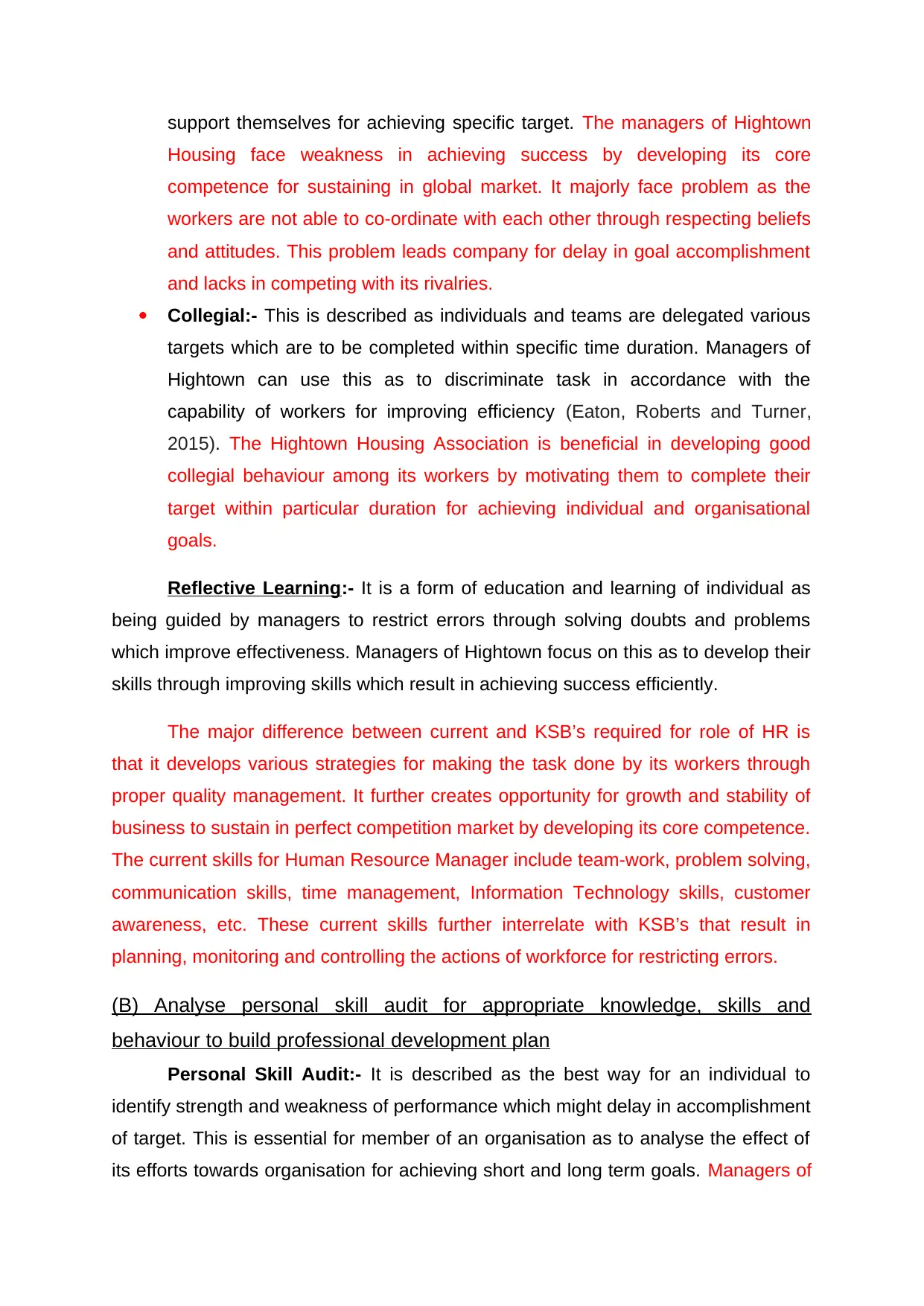
support themselves for achieving specific target. The managers of Hightown
Housing face weakness in achieving success by developing its core
competence for sustaining in global market. It majorly face problem as the
workers are not able to co-ordinate with each other through respecting beliefs
and attitudes. This problem leads company for delay in goal accomplishment
and lacks in competing with its rivalries.
Collegial:- This is described as individuals and teams are delegated various
targets which are to be completed within specific time duration. Managers of
Hightown can use this as to discriminate task in accordance with the
capability of workers for improving efficiency (Eaton, Roberts and Turner,
2015). The Hightown Housing Association is beneficial in developing good
collegial behaviour among its workers by motivating them to complete their
target within particular duration for achieving individual and organisational
goals.
Reflective Learning:- It is a form of education and learning of individual as
being guided by managers to restrict errors through solving doubts and problems
which improve effectiveness. Managers of Hightown focus on this as to develop their
skills through improving skills which result in achieving success efficiently.
The major difference between current and KSB’s required for role of HR is
that it develops various strategies for making the task done by its workers through
proper quality management. It further creates opportunity for growth and stability of
business to sustain in perfect competition market by developing its core competence.
The current skills for Human Resource Manager include team-work, problem solving,
communication skills, time management, Information Technology skills, customer
awareness, etc. These current skills further interrelate with KSB’s that result in
planning, monitoring and controlling the actions of workforce for restricting errors.
(B) Analyse personal skill audit for appropriate knowledge, skills and
behaviour to build professional development plan
Personal Skill Audit:- It is described as the best way for an individual to
identify strength and weakness of performance which might delay in accomplishment
of target. This is essential for member of an organisation as to analyse the effect of
its efforts towards organisation for achieving short and long term goals. Managers of
Housing face weakness in achieving success by developing its core
competence for sustaining in global market. It majorly face problem as the
workers are not able to co-ordinate with each other through respecting beliefs
and attitudes. This problem leads company for delay in goal accomplishment
and lacks in competing with its rivalries.
Collegial:- This is described as individuals and teams are delegated various
targets which are to be completed within specific time duration. Managers of
Hightown can use this as to discriminate task in accordance with the
capability of workers for improving efficiency (Eaton, Roberts and Turner,
2015). The Hightown Housing Association is beneficial in developing good
collegial behaviour among its workers by motivating them to complete their
target within particular duration for achieving individual and organisational
goals.
Reflective Learning:- It is a form of education and learning of individual as
being guided by managers to restrict errors through solving doubts and problems
which improve effectiveness. Managers of Hightown focus on this as to develop their
skills through improving skills which result in achieving success efficiently.
The major difference between current and KSB’s required for role of HR is
that it develops various strategies for making the task done by its workers through
proper quality management. It further creates opportunity for growth and stability of
business to sustain in perfect competition market by developing its core competence.
The current skills for Human Resource Manager include team-work, problem solving,
communication skills, time management, Information Technology skills, customer
awareness, etc. These current skills further interrelate with KSB’s that result in
planning, monitoring and controlling the actions of workforce for restricting errors.
(B) Analyse personal skill audit for appropriate knowledge, skills and
behaviour to build professional development plan
Personal Skill Audit:- It is described as the best way for an individual to
identify strength and weakness of performance which might delay in accomplishment
of target. This is essential for member of an organisation as to analyse the effect of
its efforts towards organisation for achieving short and long term goals. Managers of
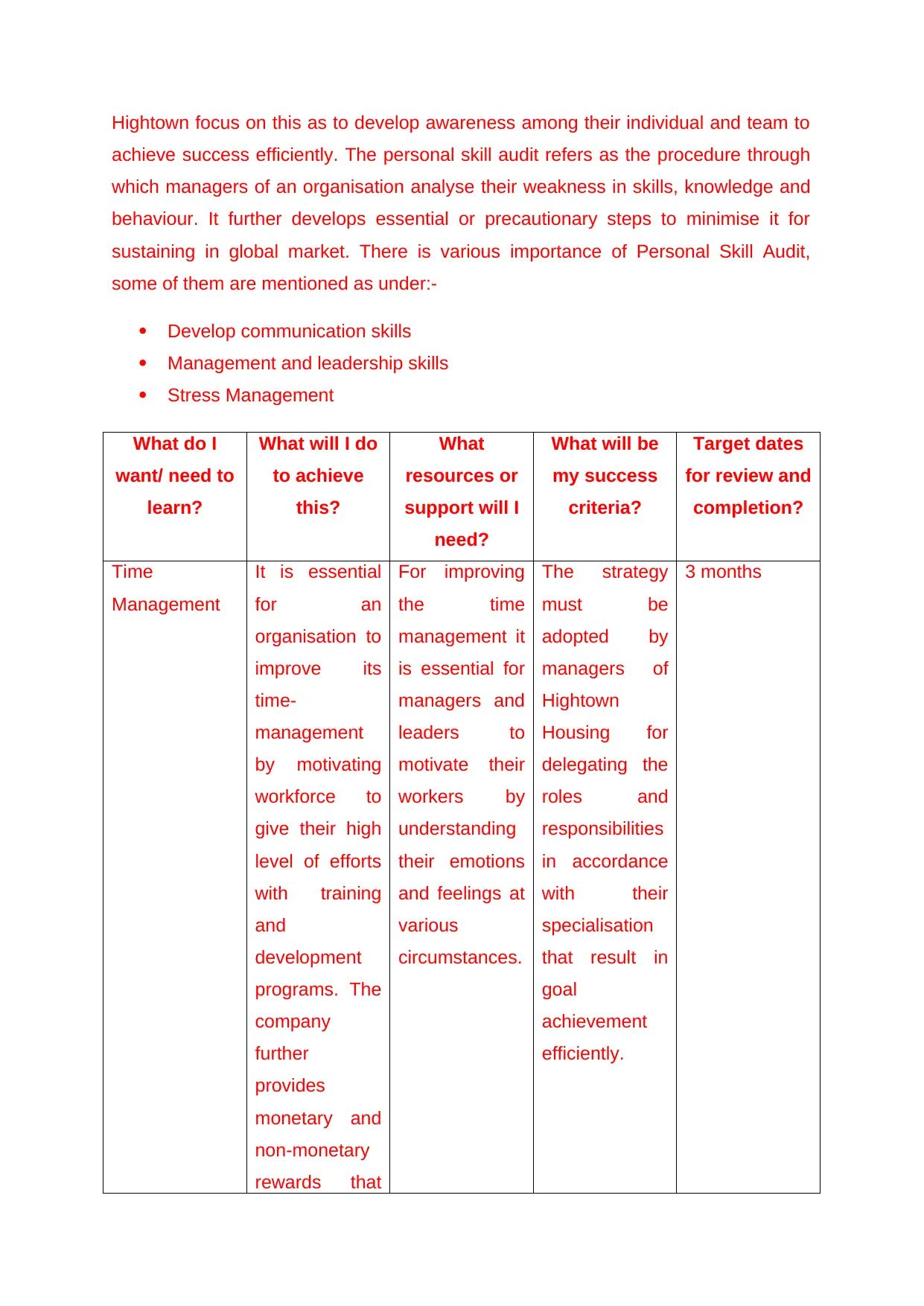
Hightown focus on this as to develop awareness among their individual and team to
achieve success efficiently. The personal skill audit refers as the procedure through
which managers of an organisation analyse their weakness in skills, knowledge and
behaviour. It further develops essential or precautionary steps to minimise it for
sustaining in global market. There is various importance of Personal Skill Audit,
some of them are mentioned as under:-
Develop communication skills
Management and leadership skills
Stress Management
What do I
want/ need to
learn?
What will I do
to achieve
this?
What
resources or
support will I
need?
What will be
my success
criteria?
Target dates
for review and
completion?
Time
Management
It is essential
for an
organisation to
improve its
time-
management
by motivating
workforce to
give their high
level of efforts
with training
and
development
programs. The
company
further
provides
monetary and
non-monetary
rewards that
For improving
the time
management it
is essential for
managers and
leaders to
motivate their
workers by
understanding
their emotions
and feelings at
various
circumstances.
The strategy
must be
adopted by
managers of
Hightown
Housing for
delegating the
roles and
responsibilities
in accordance
with their
specialisation
that result in
goal
achievement
efficiently.
3 months
achieve success efficiently. The personal skill audit refers as the procedure through
which managers of an organisation analyse their weakness in skills, knowledge and
behaviour. It further develops essential or precautionary steps to minimise it for
sustaining in global market. There is various importance of Personal Skill Audit,
some of them are mentioned as under:-
Develop communication skills
Management and leadership skills
Stress Management
What do I
want/ need to
learn?
What will I do
to achieve
this?
What
resources or
support will I
need?
What will be
my success
criteria?
Target dates
for review and
completion?
Time
Management
It is essential
for an
organisation to
improve its
time-
management
by motivating
workforce to
give their high
level of efforts
with training
and
development
programs. The
company
further
provides
monetary and
non-monetary
rewards that
For improving
the time
management it
is essential for
managers and
leaders to
motivate their
workers by
understanding
their emotions
and feelings at
various
circumstances.
The strategy
must be
adopted by
managers of
Hightown
Housing for
delegating the
roles and
responsibilities
in accordance
with their
specialisation
that result in
goal
achievement
efficiently.
3 months
Paraphrase This Document
Need a fresh take? Get an instant paraphrase of this document with our AI Paraphraser
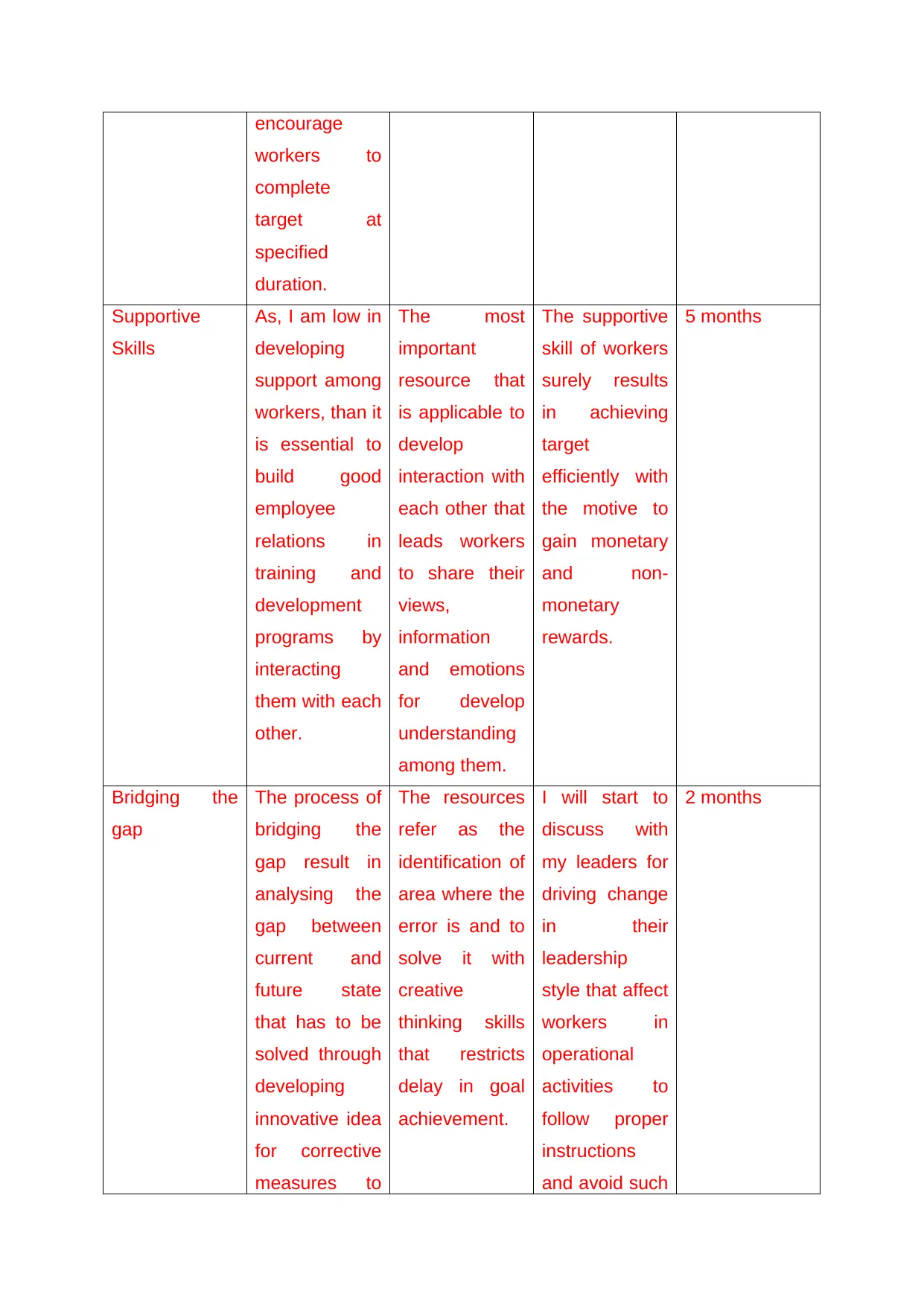
encourage
workers to
complete
target at
specified
duration.
Supportive
Skills
As, I am low in
developing
support among
workers, than it
is essential to
build good
employee
relations in
training and
development
programs by
interacting
them with each
other.
The most
important
resource that
is applicable to
develop
interaction with
each other that
leads workers
to share their
views,
information
and emotions
for develop
understanding
among them.
The supportive
skill of workers
surely results
in achieving
target
efficiently with
the motive to
gain monetary
and non-
monetary
rewards.
5 months
Bridging the
gap
The process of
bridging the
gap result in
analysing the
gap between
current and
future state
that has to be
solved through
developing
innovative idea
for corrective
measures to
The resources
refer as the
identification of
area where the
error is and to
solve it with
creative
thinking skills
that restricts
delay in goal
achievement.
I will start to
discuss with
my leaders for
driving change
in their
leadership
style that affect
workers in
operational
activities to
follow proper
instructions
and avoid such
2 months
workers to
complete
target at
specified
duration.
Supportive
Skills
As, I am low in
developing
support among
workers, than it
is essential to
build good
employee
relations in
training and
development
programs by
interacting
them with each
other.
The most
important
resource that
is applicable to
develop
interaction with
each other that
leads workers
to share their
views,
information
and emotions
for develop
understanding
among them.
The supportive
skill of workers
surely results
in achieving
target
efficiently with
the motive to
gain monetary
and non-
monetary
rewards.
5 months
Bridging the
gap
The process of
bridging the
gap result in
analysing the
gap between
current and
future state
that has to be
solved through
developing
innovative idea
for corrective
measures to
The resources
refer as the
identification of
area where the
error is and to
solve it with
creative
thinking skills
that restricts
delay in goal
achievement.
I will start to
discuss with
my leaders for
driving change
in their
leadership
style that affect
workers in
operational
activities to
follow proper
instructions
and avoid such
2 months
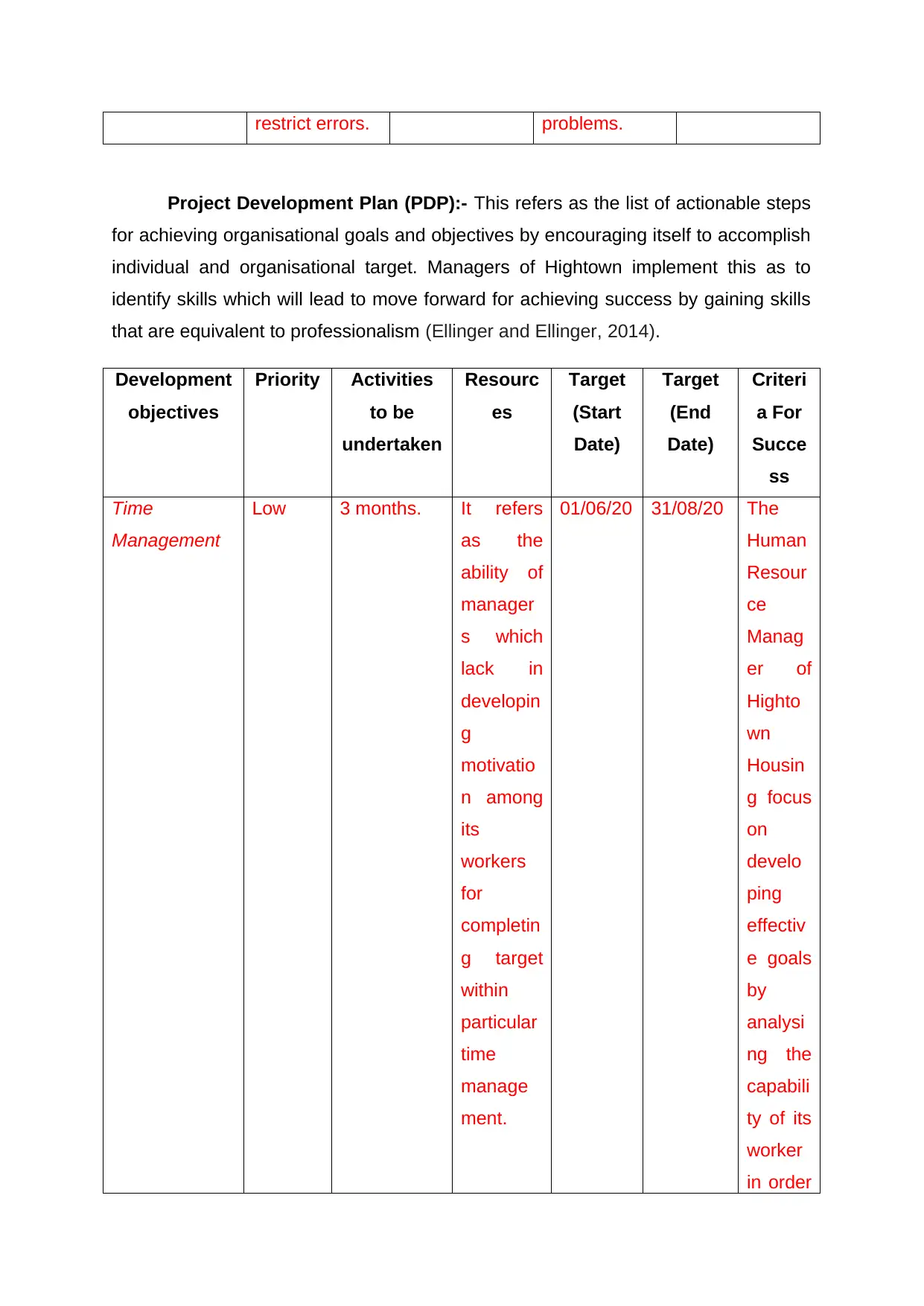
restrict errors. problems.
Project Development Plan (PDP):- This refers as the list of actionable steps
for achieving organisational goals and objectives by encouraging itself to accomplish
individual and organisational target. Managers of Hightown implement this as to
identify skills which will lead to move forward for achieving success by gaining skills
that are equivalent to professionalism (Ellinger and Ellinger, 2014).
Development
objectives
Priority Activities
to be
undertaken
Resourc
es
Target
(Start
Date)
Target
(End
Date)
Criteri
a For
Succe
ss
Time
Management
Low 3 months. It refers
as the
ability of
manager
s which
lack in
developin
g
motivatio
n among
its
workers
for
completin
g target
within
particular
time
manage
ment.
01/06/20 31/08/20 The
Human
Resour
ce
Manag
er of
Highto
wn
Housin
g focus
on
develo
ping
effectiv
e goals
by
analysi
ng the
capabili
ty of its
worker
in order
Project Development Plan (PDP):- This refers as the list of actionable steps
for achieving organisational goals and objectives by encouraging itself to accomplish
individual and organisational target. Managers of Hightown implement this as to
identify skills which will lead to move forward for achieving success by gaining skills
that are equivalent to professionalism (Ellinger and Ellinger, 2014).
Development
objectives
Priority Activities
to be
undertaken
Resourc
es
Target
(Start
Date)
Target
(End
Date)
Criteri
a For
Succe
ss
Time
Management
Low 3 months. It refers
as the
ability of
manager
s which
lack in
developin
g
motivatio
n among
its
workers
for
completin
g target
within
particular
time
manage
ment.
01/06/20 31/08/20 The
Human
Resour
ce
Manag
er of
Highto
wn
Housin
g focus
on
develo
ping
effectiv
e goals
by
analysi
ng the
capabili
ty of its
worker
in order
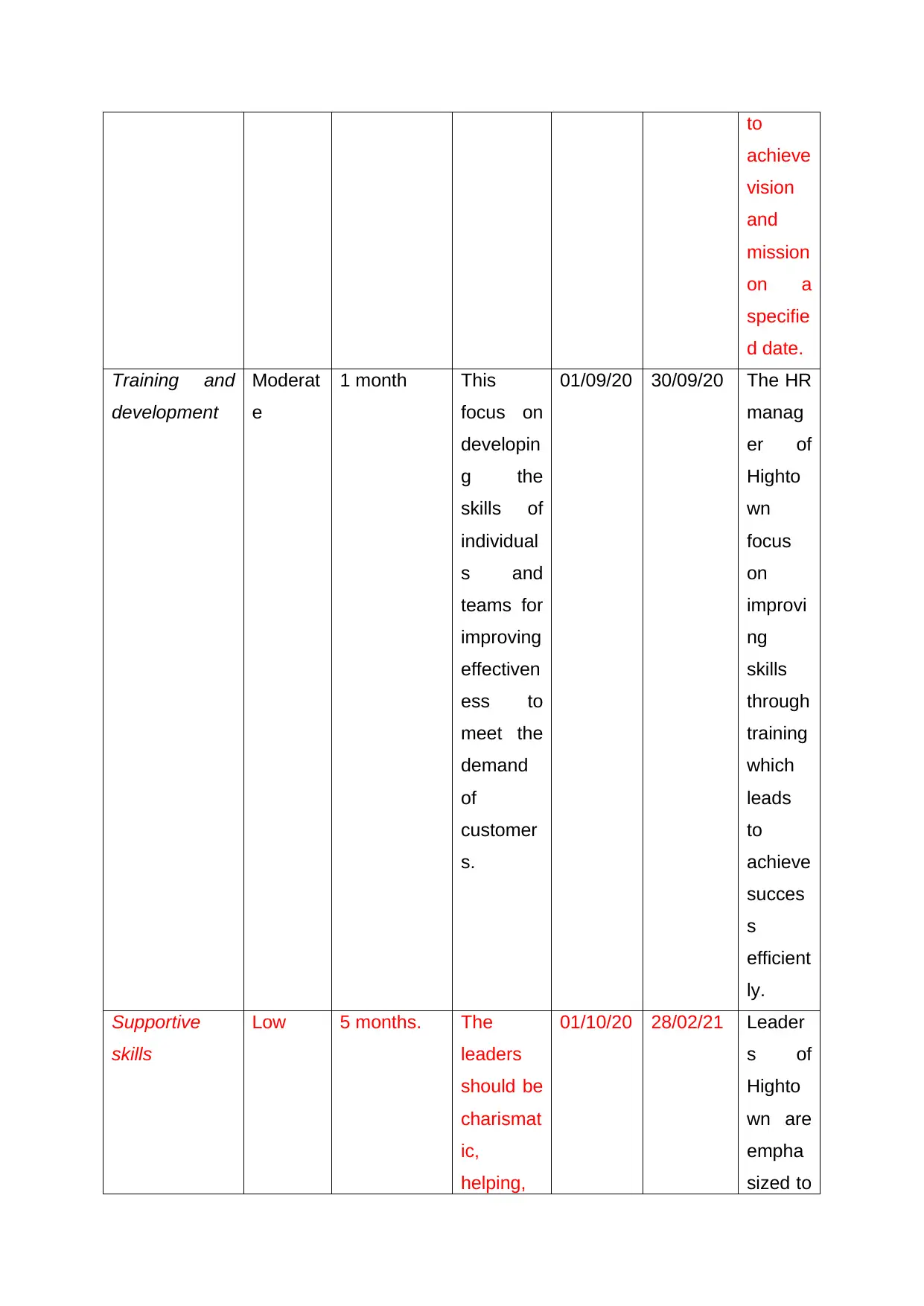
to
achieve
vision
and
mission
on a
specifie
d date.
Training and
development
Moderat
e
1 month This
focus on
developin
g the
skills of
individual
s and
teams for
improving
effectiven
ess to
meet the
demand
of
customer
s.
01/09/20 30/09/20 The HR
manag
er of
Highto
wn
focus
on
improvi
ng
skills
through
training
which
leads
to
achieve
succes
s
efficient
ly.
Supportive
skills
Low 5 months. The
leaders
should be
charismat
ic,
helping,
01/10/20 28/02/21 Leader
s of
Highto
wn are
empha
sized to
achieve
vision
and
mission
on a
specifie
d date.
Training and
development
Moderat
e
1 month This
focus on
developin
g the
skills of
individual
s and
teams for
improving
effectiven
ess to
meet the
demand
of
customer
s.
01/09/20 30/09/20 The HR
manag
er of
Highto
wn
focus
on
improvi
ng
skills
through
training
which
leads
to
achieve
succes
s
efficient
ly.
Supportive
skills
Low 5 months. The
leaders
should be
charismat
ic,
helping,
01/10/20 28/02/21 Leader
s of
Highto
wn are
empha
sized to
Secure Best Marks with AI Grader
Need help grading? Try our AI Grader for instant feedback on your assignments.
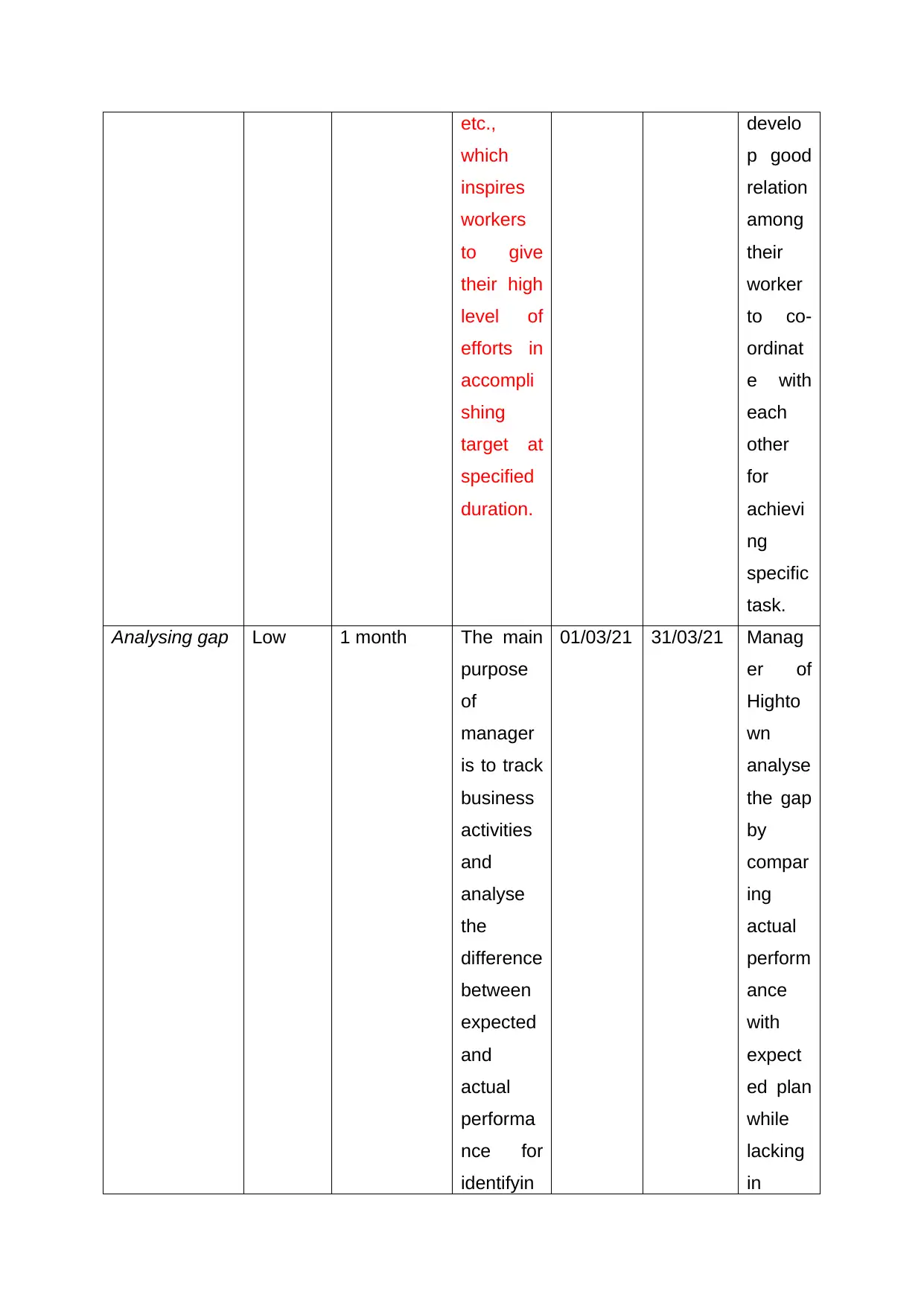
etc.,
which
inspires
workers
to give
their high
level of
efforts in
accompli
shing
target at
specified
duration.
develo
p good
relation
among
their
worker
to co-
ordinat
e with
each
other
for
achievi
ng
specific
task.
Analysing gap Low 1 month The main
purpose
of
manager
is to track
business
activities
and
analyse
the
difference
between
expected
and
actual
performa
nce for
identifyin
01/03/21 31/03/21 Manag
er of
Highto
wn
analyse
the gap
by
compar
ing
actual
perform
ance
with
expect
ed plan
while
lacking
in
which
inspires
workers
to give
their high
level of
efforts in
accompli
shing
target at
specified
duration.
develo
p good
relation
among
their
worker
to co-
ordinat
e with
each
other
for
achievi
ng
specific
task.
Analysing gap Low 1 month The main
purpose
of
manager
is to track
business
activities
and
analyse
the
difference
between
expected
and
actual
performa
nce for
identifyin
01/03/21 31/03/21 Manag
er of
Highto
wn
analyse
the gap
by
compar
ing
actual
perform
ance
with
expect
ed plan
while
lacking
in
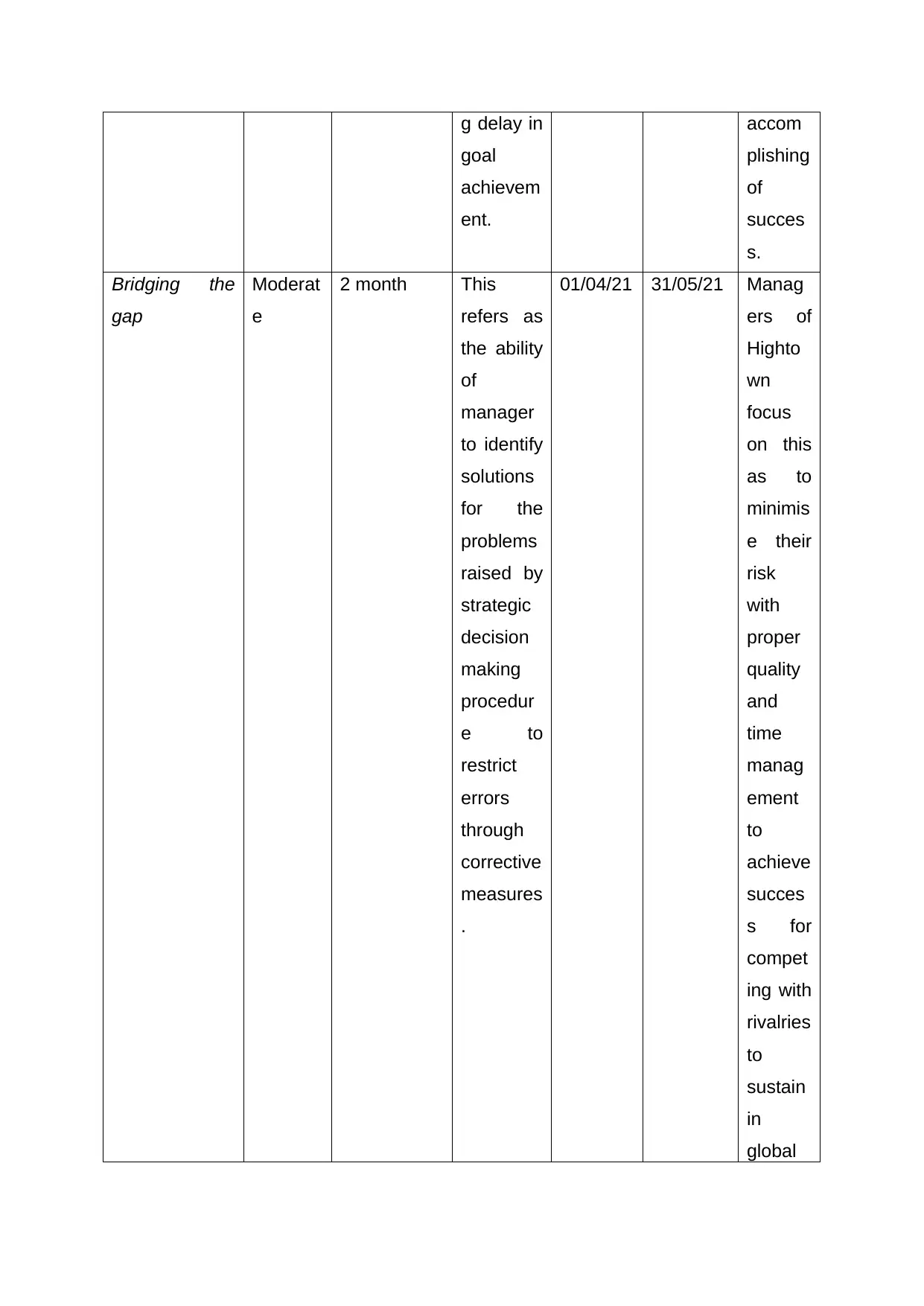
g delay in
goal
achievem
ent.
accom
plishing
of
succes
s.
Bridging the
gap
Moderat
e
2 month This
refers as
the ability
of
manager
to identify
solutions
for the
problems
raised by
strategic
decision
making
procedur
e to
restrict
errors
through
corrective
measures
.
01/04/21 31/05/21 Manag
ers of
Highto
wn
focus
on this
as to
minimis
e their
risk
with
proper
quality
and
time
manag
ement
to
achieve
succes
s for
compet
ing with
rivalries
to
sustain
in
global
goal
achievem
ent.
accom
plishing
of
succes
s.
Bridging the
gap
Moderat
e
2 month This
refers as
the ability
of
manager
to identify
solutions
for the
problems
raised by
strategic
decision
making
procedur
e to
restrict
errors
through
corrective
measures
.
01/04/21 31/05/21 Manag
ers of
Highto
wn
focus
on this
as to
minimis
e their
risk
with
proper
quality
and
time
manag
ement
to
achieve
succes
s for
compet
ing with
rivalries
to
sustain
in
global
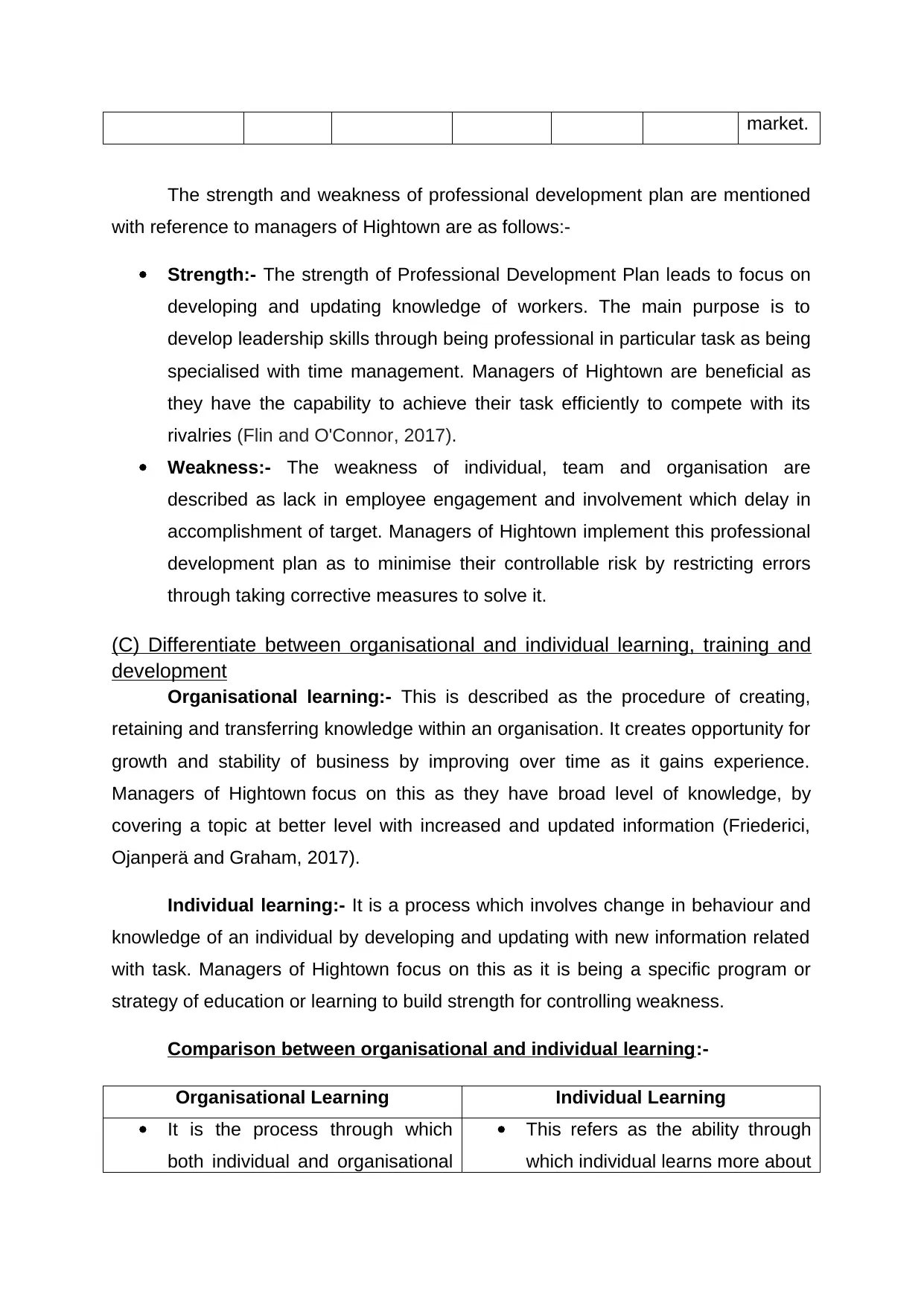
market.
The strength and weakness of professional development plan are mentioned
with reference to managers of Hightown are as follows:-
Strength:- The strength of Professional Development Plan leads to focus on
developing and updating knowledge of workers. The main purpose is to
develop leadership skills through being professional in particular task as being
specialised with time management. Managers of Hightown are beneficial as
they have the capability to achieve their task efficiently to compete with its
rivalries (Flin and O'Connor, 2017).
Weakness:- The weakness of individual, team and organisation are
described as lack in employee engagement and involvement which delay in
accomplishment of target. Managers of Hightown implement this professional
development plan as to minimise their controllable risk by restricting errors
through taking corrective measures to solve it.
(C) Differentiate between organisational and individual learning, training and
development
Organisational learning:- This is described as the procedure of creating,
retaining and transferring knowledge within an organisation. It creates opportunity for
growth and stability of business by improving over time as it gains experience.
Managers of Hightown focus on this as they have broad level of knowledge, by
covering a topic at better level with increased and updated information (Friederici,
Ojanperä and Graham, 2017).
Individual learning:- It is a process which involves change in behaviour and
knowledge of an individual by developing and updating with new information related
with task. Managers of Hightown focus on this as it is being a specific program or
strategy of education or learning to build strength for controlling weakness.
Comparison between organisational and individual learning:-
Organisational Learning Individual Learning
It is the process through which
both individual and organisational
This refers as the ability through
which individual learns more about
The strength and weakness of professional development plan are mentioned
with reference to managers of Hightown are as follows:-
Strength:- The strength of Professional Development Plan leads to focus on
developing and updating knowledge of workers. The main purpose is to
develop leadership skills through being professional in particular task as being
specialised with time management. Managers of Hightown are beneficial as
they have the capability to achieve their task efficiently to compete with its
rivalries (Flin and O'Connor, 2017).
Weakness:- The weakness of individual, team and organisation are
described as lack in employee engagement and involvement which delay in
accomplishment of target. Managers of Hightown implement this professional
development plan as to minimise their controllable risk by restricting errors
through taking corrective measures to solve it.
(C) Differentiate between organisational and individual learning, training and
development
Organisational learning:- This is described as the procedure of creating,
retaining and transferring knowledge within an organisation. It creates opportunity for
growth and stability of business by improving over time as it gains experience.
Managers of Hightown focus on this as they have broad level of knowledge, by
covering a topic at better level with increased and updated information (Friederici,
Ojanperä and Graham, 2017).
Individual learning:- It is a process which involves change in behaviour and
knowledge of an individual by developing and updating with new information related
with task. Managers of Hightown focus on this as it is being a specific program or
strategy of education or learning to build strength for controlling weakness.
Comparison between organisational and individual learning:-
Organisational Learning Individual Learning
It is the process through which
both individual and organisational
This refers as the ability through
which individual learns more about
Paraphrase This Document
Need a fresh take? Get an instant paraphrase of this document with our AI Paraphraser
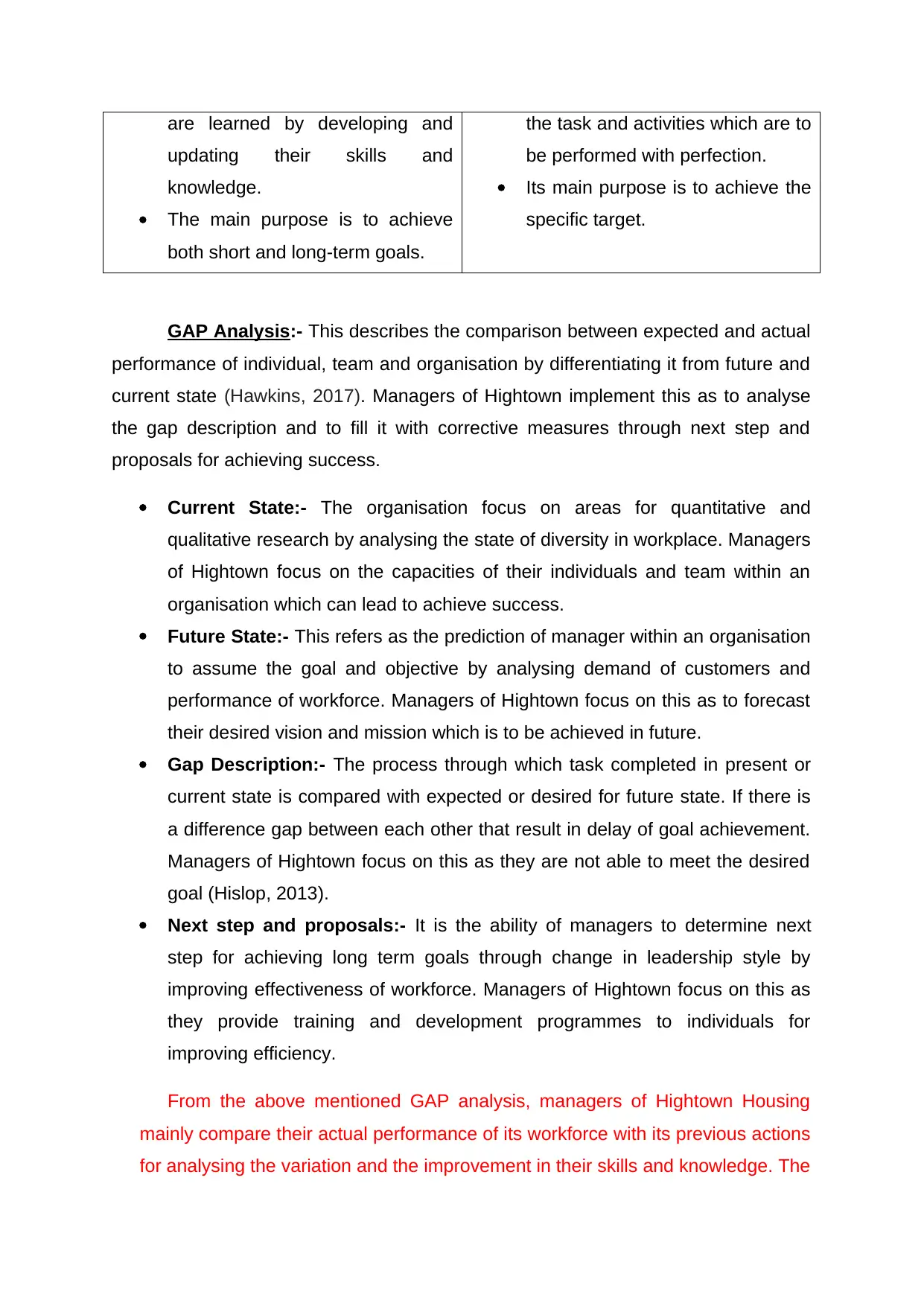
are learned by developing and
updating their skills and
knowledge.
The main purpose is to achieve
both short and long-term goals.
the task and activities which are to
be performed with perfection.
Its main purpose is to achieve the
specific target.
GAP Analysis:- This describes the comparison between expected and actual
performance of individual, team and organisation by differentiating it from future and
current state (Hawkins, 2017). Managers of Hightown implement this as to analyse
the gap description and to fill it with corrective measures through next step and
proposals for achieving success.
Current State:- The organisation focus on areas for quantitative and
qualitative research by analysing the state of diversity in workplace. Managers
of Hightown focus on the capacities of their individuals and team within an
organisation which can lead to achieve success.
Future State:- This refers as the prediction of manager within an organisation
to assume the goal and objective by analysing demand of customers and
performance of workforce. Managers of Hightown focus on this as to forecast
their desired vision and mission which is to be achieved in future.
Gap Description:- The process through which task completed in present or
current state is compared with expected or desired for future state. If there is
a difference gap between each other that result in delay of goal achievement.
Managers of Hightown focus on this as they are not able to meet the desired
goal (Hislop, 2013).
Next step and proposals:- It is the ability of managers to determine next
step for achieving long term goals through change in leadership style by
improving effectiveness of workforce. Managers of Hightown focus on this as
they provide training and development programmes to individuals for
improving efficiency.
From the above mentioned GAP analysis, managers of Hightown Housing
mainly compare their actual performance of its workforce with its previous actions
for analysing the variation and the improvement in their skills and knowledge. The
updating their skills and
knowledge.
The main purpose is to achieve
both short and long-term goals.
the task and activities which are to
be performed with perfection.
Its main purpose is to achieve the
specific target.
GAP Analysis:- This describes the comparison between expected and actual
performance of individual, team and organisation by differentiating it from future and
current state (Hawkins, 2017). Managers of Hightown implement this as to analyse
the gap description and to fill it with corrective measures through next step and
proposals for achieving success.
Current State:- The organisation focus on areas for quantitative and
qualitative research by analysing the state of diversity in workplace. Managers
of Hightown focus on the capacities of their individuals and team within an
organisation which can lead to achieve success.
Future State:- This refers as the prediction of manager within an organisation
to assume the goal and objective by analysing demand of customers and
performance of workforce. Managers of Hightown focus on this as to forecast
their desired vision and mission which is to be achieved in future.
Gap Description:- The process through which task completed in present or
current state is compared with expected or desired for future state. If there is
a difference gap between each other that result in delay of goal achievement.
Managers of Hightown focus on this as they are not able to meet the desired
goal (Hislop, 2013).
Next step and proposals:- It is the ability of managers to determine next
step for achieving long term goals through change in leadership style by
improving effectiveness of workforce. Managers of Hightown focus on this as
they provide training and development programmes to individuals for
improving efficiency.
From the above mentioned GAP analysis, managers of Hightown Housing
mainly compare their actual performance of its workforce with its previous actions
for analysing the variation and the improvement in their skills and knowledge. The
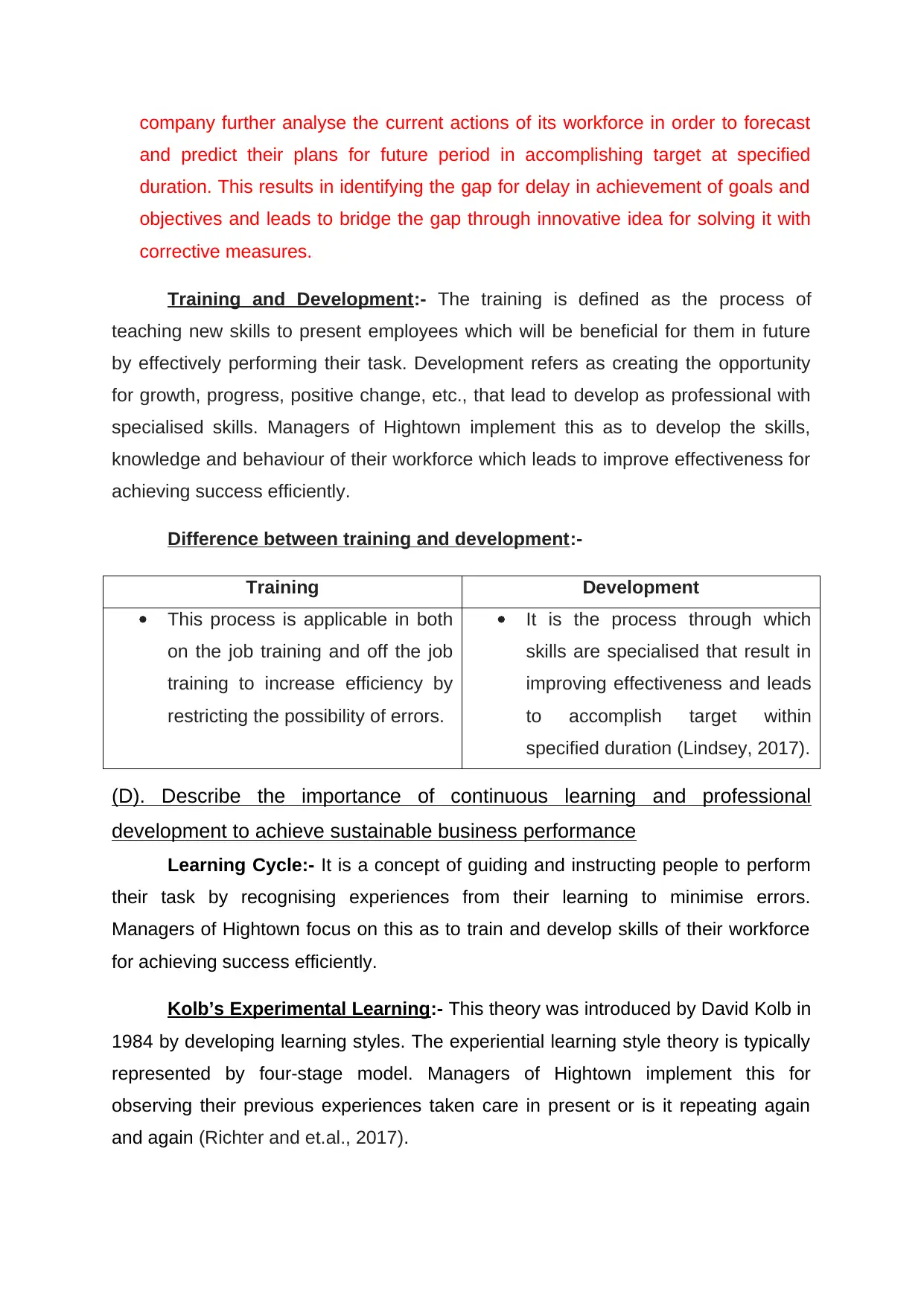
company further analyse the current actions of its workforce in order to forecast
and predict their plans for future period in accomplishing target at specified
duration. This results in identifying the gap for delay in achievement of goals and
objectives and leads to bridge the gap through innovative idea for solving it with
corrective measures.
Training and Development:- The training is defined as the process of
teaching new skills to present employees which will be beneficial for them in future
by effectively performing their task. Development refers as creating the opportunity
for growth, progress, positive change, etc., that lead to develop as professional with
specialised skills. Managers of Hightown implement this as to develop the skills,
knowledge and behaviour of their workforce which leads to improve effectiveness for
achieving success efficiently.
Difference between training and development:-
Training Development
This process is applicable in both
on the job training and off the job
training to increase efficiency by
restricting the possibility of errors.
It is the process through which
skills are specialised that result in
improving effectiveness and leads
to accomplish target within
specified duration (Lindsey, 2017).
(D). Describe the importance of continuous learning and professional
development to achieve sustainable business performance
Learning Cycle:- It is a concept of guiding and instructing people to perform
their task by recognising experiences from their learning to minimise errors.
Managers of Hightown focus on this as to train and develop skills of their workforce
for achieving success efficiently.
Kolb’s Experimental Learning:- This theory was introduced by David Kolb in
1984 by developing learning styles. The experiential learning style theory is typically
represented by four-stage model. Managers of Hightown implement this for
observing their previous experiences taken care in present or is it repeating again
and again (Richter and et.al., 2017).
and predict their plans for future period in accomplishing target at specified
duration. This results in identifying the gap for delay in achievement of goals and
objectives and leads to bridge the gap through innovative idea for solving it with
corrective measures.
Training and Development:- The training is defined as the process of
teaching new skills to present employees which will be beneficial for them in future
by effectively performing their task. Development refers as creating the opportunity
for growth, progress, positive change, etc., that lead to develop as professional with
specialised skills. Managers of Hightown implement this as to develop the skills,
knowledge and behaviour of their workforce which leads to improve effectiveness for
achieving success efficiently.
Difference between training and development:-
Training Development
This process is applicable in both
on the job training and off the job
training to increase efficiency by
restricting the possibility of errors.
It is the process through which
skills are specialised that result in
improving effectiveness and leads
to accomplish target within
specified duration (Lindsey, 2017).
(D). Describe the importance of continuous learning and professional
development to achieve sustainable business performance
Learning Cycle:- It is a concept of guiding and instructing people to perform
their task by recognising experiences from their learning to minimise errors.
Managers of Hightown focus on this as to train and develop skills of their workforce
for achieving success efficiently.
Kolb’s Experimental Learning:- This theory was introduced by David Kolb in
1984 by developing learning styles. The experiential learning style theory is typically
represented by four-stage model. Managers of Hightown implement this for
observing their previous experiences taken care in present or is it repeating again
and again (Richter and et.al., 2017).
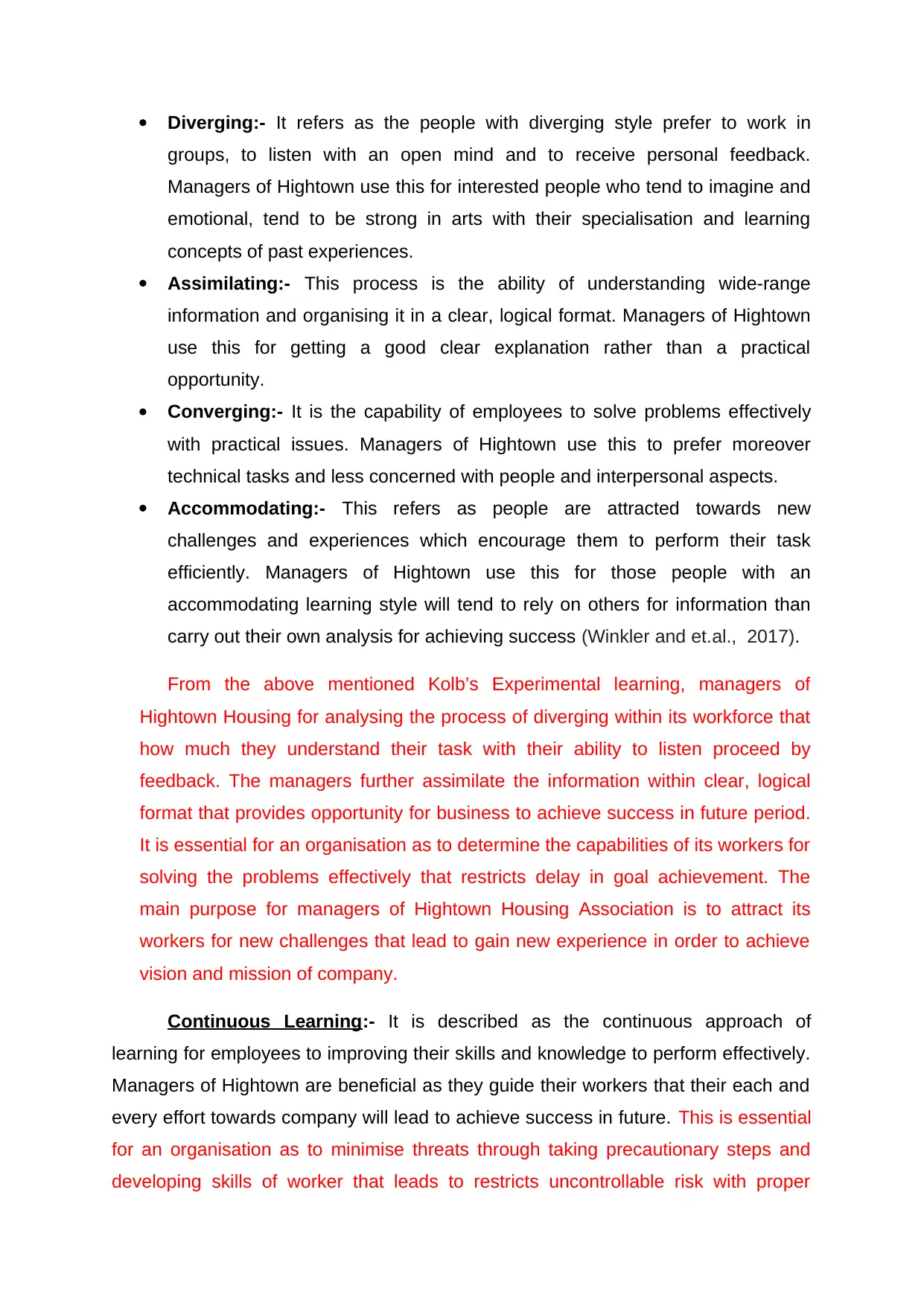
Diverging:- It refers as the people with diverging style prefer to work in
groups, to listen with an open mind and to receive personal feedback.
Managers of Hightown use this for interested people who tend to imagine and
emotional, tend to be strong in arts with their specialisation and learning
concepts of past experiences.
Assimilating:- This process is the ability of understanding wide-range
information and organising it in a clear, logical format. Managers of Hightown
use this for getting a good clear explanation rather than a practical
opportunity.
Converging:- It is the capability of employees to solve problems effectively
with practical issues. Managers of Hightown use this to prefer moreover
technical tasks and less concerned with people and interpersonal aspects.
Accommodating:- This refers as people are attracted towards new
challenges and experiences which encourage them to perform their task
efficiently. Managers of Hightown use this for those people with an
accommodating learning style will tend to rely on others for information than
carry out their own analysis for achieving success (Winkler and et.al., 2017).
From the above mentioned Kolb’s Experimental learning, managers of
Hightown Housing for analysing the process of diverging within its workforce that
how much they understand their task with their ability to listen proceed by
feedback. The managers further assimilate the information within clear, logical
format that provides opportunity for business to achieve success in future period.
It is essential for an organisation as to determine the capabilities of its workers for
solving the problems effectively that restricts delay in goal achievement. The
main purpose for managers of Hightown Housing Association is to attract its
workers for new challenges that lead to gain new experience in order to achieve
vision and mission of company.
Continuous Learning:- It is described as the continuous approach of
learning for employees to improving their skills and knowledge to perform effectively.
Managers of Hightown are beneficial as they guide their workers that their each and
every effort towards company will lead to achieve success in future. This is essential
for an organisation as to minimise threats through taking precautionary steps and
developing skills of worker that leads to restricts uncontrollable risk with proper
groups, to listen with an open mind and to receive personal feedback.
Managers of Hightown use this for interested people who tend to imagine and
emotional, tend to be strong in arts with their specialisation and learning
concepts of past experiences.
Assimilating:- This process is the ability of understanding wide-range
information and organising it in a clear, logical format. Managers of Hightown
use this for getting a good clear explanation rather than a practical
opportunity.
Converging:- It is the capability of employees to solve problems effectively
with practical issues. Managers of Hightown use this to prefer moreover
technical tasks and less concerned with people and interpersonal aspects.
Accommodating:- This refers as people are attracted towards new
challenges and experiences which encourage them to perform their task
efficiently. Managers of Hightown use this for those people with an
accommodating learning style will tend to rely on others for information than
carry out their own analysis for achieving success (Winkler and et.al., 2017).
From the above mentioned Kolb’s Experimental learning, managers of
Hightown Housing for analysing the process of diverging within its workforce that
how much they understand their task with their ability to listen proceed by
feedback. The managers further assimilate the information within clear, logical
format that provides opportunity for business to achieve success in future period.
It is essential for an organisation as to determine the capabilities of its workers for
solving the problems effectively that restricts delay in goal achievement. The
main purpose for managers of Hightown Housing Association is to attract its
workers for new challenges that lead to gain new experience in order to achieve
vision and mission of company.
Continuous Learning:- It is described as the continuous approach of
learning for employees to improving their skills and knowledge to perform effectively.
Managers of Hightown are beneficial as they guide their workers that their each and
every effort towards company will lead to achieve success in future. This is essential
for an organisation as to minimise threats through taking precautionary steps and
developing skills of worker that leads to restricts uncontrollable risk with proper
Secure Best Marks with AI Grader
Need help grading? Try our AI Grader for instant feedback on your assignments.
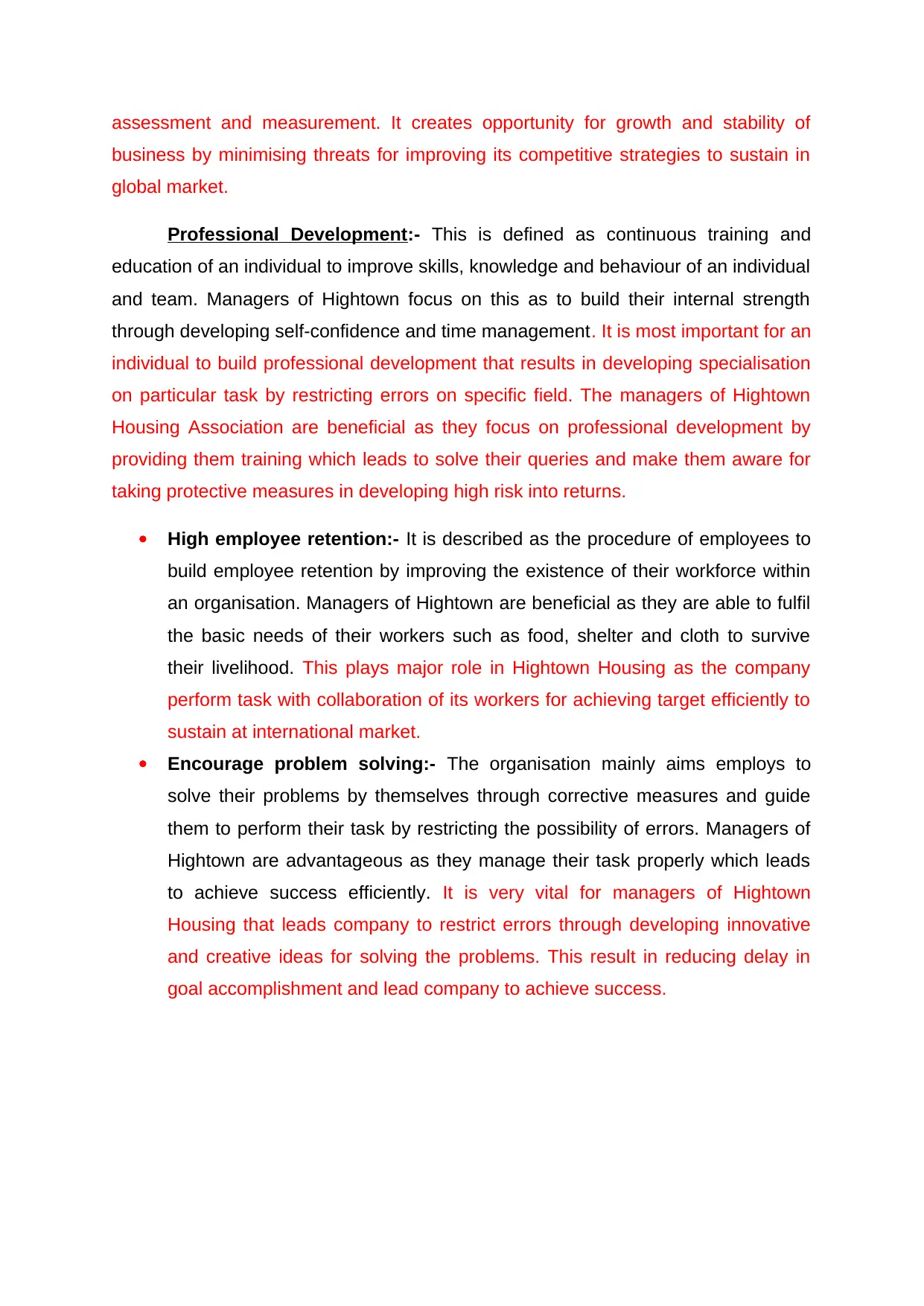
assessment and measurement. It creates opportunity for growth and stability of
business by minimising threats for improving its competitive strategies to sustain in
global market.
Professional Development:- This is defined as continuous training and
education of an individual to improve skills, knowledge and behaviour of an individual
and team. Managers of Hightown focus on this as to build their internal strength
through developing self-confidence and time management. It is most important for an
individual to build professional development that results in developing specialisation
on particular task by restricting errors on specific field. The managers of Hightown
Housing Association are beneficial as they focus on professional development by
providing them training which leads to solve their queries and make them aware for
taking protective measures in developing high risk into returns.
High employee retention:- It is described as the procedure of employees to
build employee retention by improving the existence of their workforce within
an organisation. Managers of Hightown are beneficial as they are able to fulfil
the basic needs of their workers such as food, shelter and cloth to survive
their livelihood. This plays major role in Hightown Housing as the company
perform task with collaboration of its workers for achieving target efficiently to
sustain at international market.
Encourage problem solving:- The organisation mainly aims employs to
solve their problems by themselves through corrective measures and guide
them to perform their task by restricting the possibility of errors. Managers of
Hightown are advantageous as they manage their task properly which leads
to achieve success efficiently. It is very vital for managers of Hightown
Housing that leads company to restrict errors through developing innovative
and creative ideas for solving the problems. This result in reducing delay in
goal accomplishment and lead company to achieve success.
business by minimising threats for improving its competitive strategies to sustain in
global market.
Professional Development:- This is defined as continuous training and
education of an individual to improve skills, knowledge and behaviour of an individual
and team. Managers of Hightown focus on this as to build their internal strength
through developing self-confidence and time management. It is most important for an
individual to build professional development that results in developing specialisation
on particular task by restricting errors on specific field. The managers of Hightown
Housing Association are beneficial as they focus on professional development by
providing them training which leads to solve their queries and make them aware for
taking protective measures in developing high risk into returns.
High employee retention:- It is described as the procedure of employees to
build employee retention by improving the existence of their workforce within
an organisation. Managers of Hightown are beneficial as they are able to fulfil
the basic needs of their workers such as food, shelter and cloth to survive
their livelihood. This plays major role in Hightown Housing as the company
perform task with collaboration of its workers for achieving target efficiently to
sustain at international market.
Encourage problem solving:- The organisation mainly aims employs to
solve their problems by themselves through corrective measures and guide
them to perform their task by restricting the possibility of errors. Managers of
Hightown are advantageous as they manage their task properly which leads
to achieve success efficiently. It is very vital for managers of Hightown
Housing that leads company to restrict errors through developing innovative
and creative ideas for solving the problems. This result in reducing delay in
goal accomplishment and lead company to achieve success.
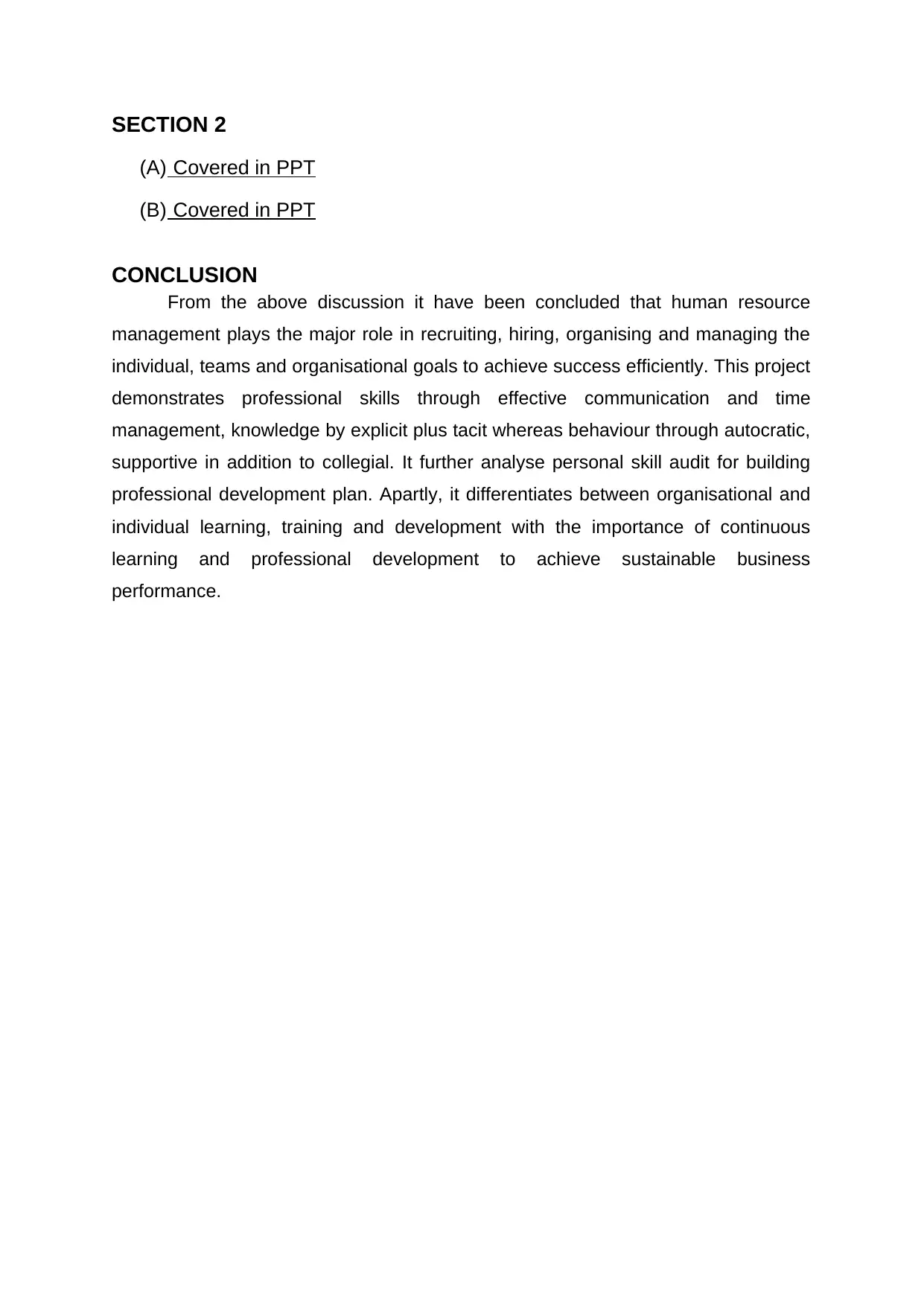
SECTION 2
(A) Covered in PPT
(B) Covered in PPT
CONCLUSION
From the above discussion it have been concluded that human resource
management plays the major role in recruiting, hiring, organising and managing the
individual, teams and organisational goals to achieve success efficiently. This project
demonstrates professional skills through effective communication and time
management, knowledge by explicit plus tacit whereas behaviour through autocratic,
supportive in addition to collegial. It further analyse personal skill audit for building
professional development plan. Apartly, it differentiates between organisational and
individual learning, training and development with the importance of continuous
learning and professional development to achieve sustainable business
performance.
(A) Covered in PPT
(B) Covered in PPT
CONCLUSION
From the above discussion it have been concluded that human resource
management plays the major role in recruiting, hiring, organising and managing the
individual, teams and organisational goals to achieve success efficiently. This project
demonstrates professional skills through effective communication and time
management, knowledge by explicit plus tacit whereas behaviour through autocratic,
supportive in addition to collegial. It further analyse personal skill audit for building
professional development plan. Apartly, it differentiates between organisational and
individual learning, training and development with the importance of continuous
learning and professional development to achieve sustainable business
performance.
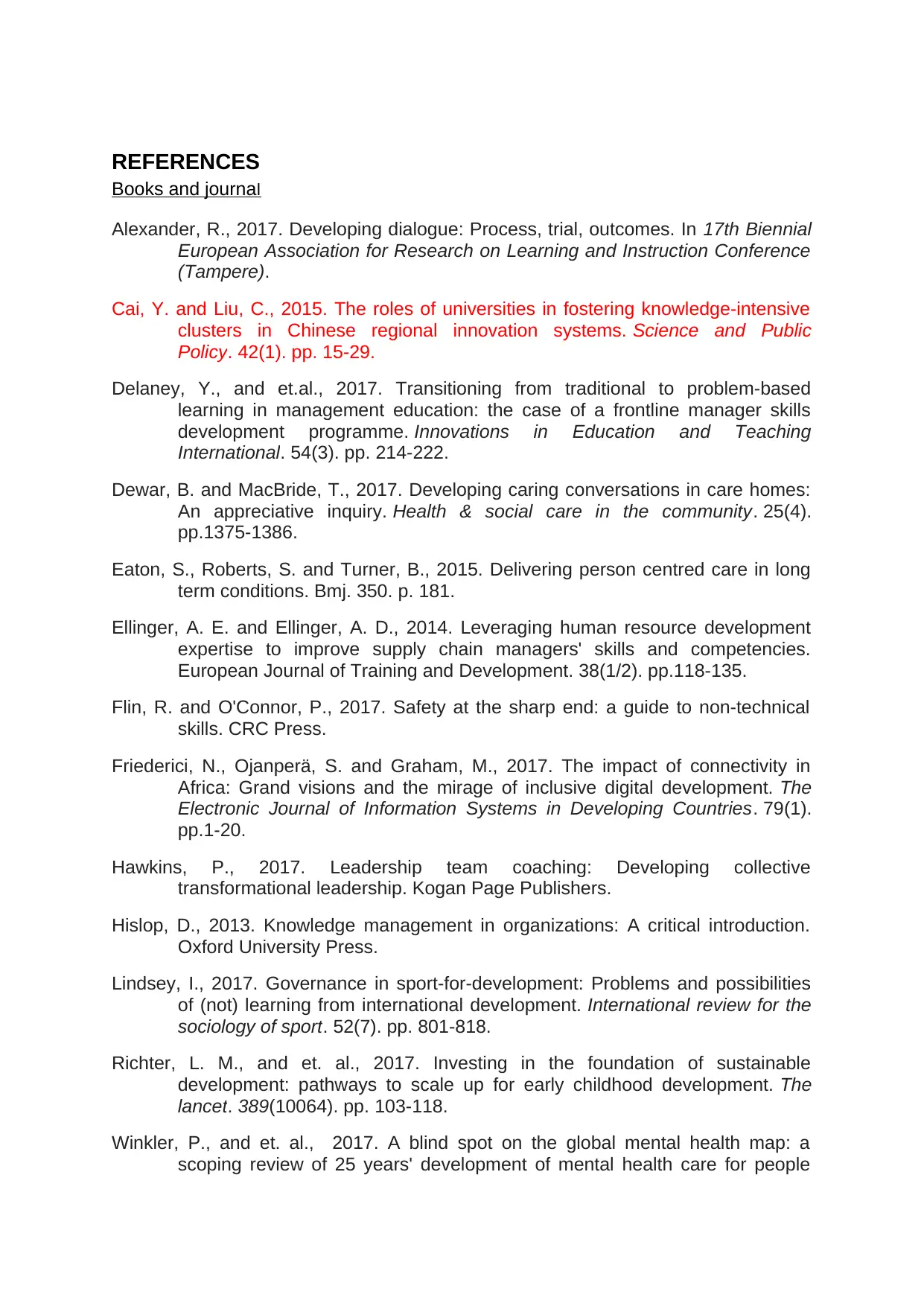
REFERENCES
Books and journal
Alexander, R., 2017. Developing dialogue: Process, trial, outcomes. In 17th Biennial
European Association for Research on Learning and Instruction Conference
(Tampere).
Cai, Y. and Liu, C., 2015. The roles of universities in fostering knowledge-intensive
clusters in Chinese regional innovation systems. Science and Public
Policy. 42(1). pp. 15-29.
Delaney, Y., and et.al., 2017. Transitioning from traditional to problem-based
learning in management education: the case of a frontline manager skills
development programme. Innovations in Education and Teaching
International. 54(3). pp. 214-222.
Dewar, B. and MacBride, T., 2017. Developing caring conversations in care homes:
An appreciative inquiry. Health & social care in the community. 25(4).
pp.1375-1386.
Eaton, S., Roberts, S. and Turner, B., 2015. Delivering person centred care in long
term conditions. Bmj. 350. p. 181.
Ellinger, A. E. and Ellinger, A. D., 2014. Leveraging human resource development
expertise to improve supply chain managers' skills and competencies.
European Journal of Training and Development. 38(1/2). pp.118-135.
Flin, R. and O'Connor, P., 2017. Safety at the sharp end: a guide to non-technical
skills. CRC Press.
Friederici, N., Ojanperä, S. and Graham, M., 2017. The impact of connectivity in
Africa: Grand visions and the mirage of inclusive digital development. The
Electronic Journal of Information Systems in Developing Countries. 79(1).
pp.1-20.
Hawkins, P., 2017. Leadership team coaching: Developing collective
transformational leadership. Kogan Page Publishers.
Hislop, D., 2013. Knowledge management in organizations: A critical introduction.
Oxford University Press.
Lindsey, I., 2017. Governance in sport-for-development: Problems and possibilities
of (not) learning from international development. International review for the
sociology of sport. 52(7). pp. 801-818.
Richter, L. M., and et. al., 2017. Investing in the foundation of sustainable
development: pathways to scale up for early childhood development. The
lancet. 389(10064). pp. 103-118.
Winkler, P., and et. al., 2017. A blind spot on the global mental health map: a
scoping review of 25 years' development of mental health care for people
Books and journal
Alexander, R., 2017. Developing dialogue: Process, trial, outcomes. In 17th Biennial
European Association for Research on Learning and Instruction Conference
(Tampere).
Cai, Y. and Liu, C., 2015. The roles of universities in fostering knowledge-intensive
clusters in Chinese regional innovation systems. Science and Public
Policy. 42(1). pp. 15-29.
Delaney, Y., and et.al., 2017. Transitioning from traditional to problem-based
learning in management education: the case of a frontline manager skills
development programme. Innovations in Education and Teaching
International. 54(3). pp. 214-222.
Dewar, B. and MacBride, T., 2017. Developing caring conversations in care homes:
An appreciative inquiry. Health & social care in the community. 25(4).
pp.1375-1386.
Eaton, S., Roberts, S. and Turner, B., 2015. Delivering person centred care in long
term conditions. Bmj. 350. p. 181.
Ellinger, A. E. and Ellinger, A. D., 2014. Leveraging human resource development
expertise to improve supply chain managers' skills and competencies.
European Journal of Training and Development. 38(1/2). pp.118-135.
Flin, R. and O'Connor, P., 2017. Safety at the sharp end: a guide to non-technical
skills. CRC Press.
Friederici, N., Ojanperä, S. and Graham, M., 2017. The impact of connectivity in
Africa: Grand visions and the mirage of inclusive digital development. The
Electronic Journal of Information Systems in Developing Countries. 79(1).
pp.1-20.
Hawkins, P., 2017. Leadership team coaching: Developing collective
transformational leadership. Kogan Page Publishers.
Hislop, D., 2013. Knowledge management in organizations: A critical introduction.
Oxford University Press.
Lindsey, I., 2017. Governance in sport-for-development: Problems and possibilities
of (not) learning from international development. International review for the
sociology of sport. 52(7). pp. 801-818.
Richter, L. M., and et. al., 2017. Investing in the foundation of sustainable
development: pathways to scale up for early childhood development. The
lancet. 389(10064). pp. 103-118.
Winkler, P., and et. al., 2017. A blind spot on the global mental health map: a
scoping review of 25 years' development of mental health care for people
Paraphrase This Document
Need a fresh take? Get an instant paraphrase of this document with our AI Paraphraser

with severe mental illnesses in central and eastern Europe. The Lancet
Psychiatry. 4(8). pp. 634-642.
Psychiatry. 4(8). pp. 634-642.
1 out of 20
Related Documents
Your All-in-One AI-Powered Toolkit for Academic Success.
+13062052269
info@desklib.com
Available 24*7 on WhatsApp / Email
![[object Object]](/_next/static/media/star-bottom.7253800d.svg)
Unlock your academic potential
© 2024 | Zucol Services PVT LTD | All rights reserved.





